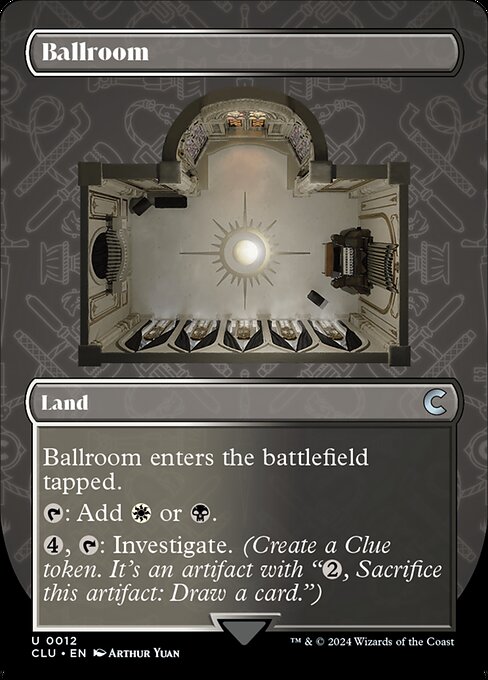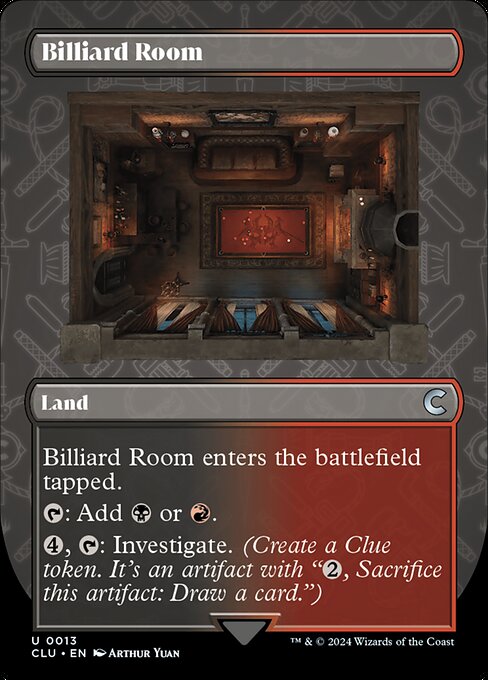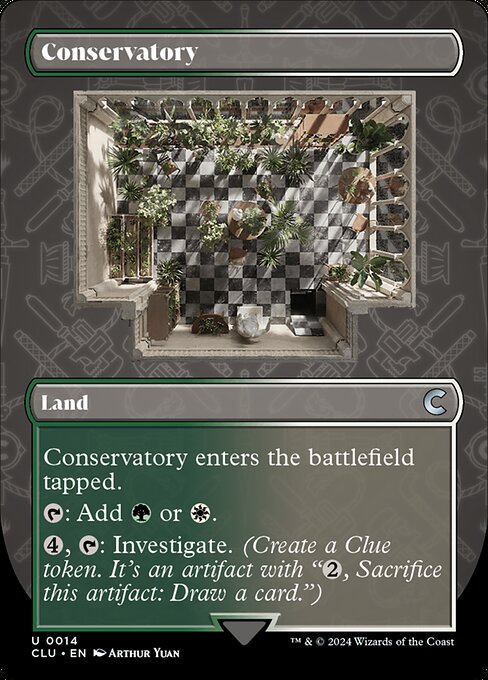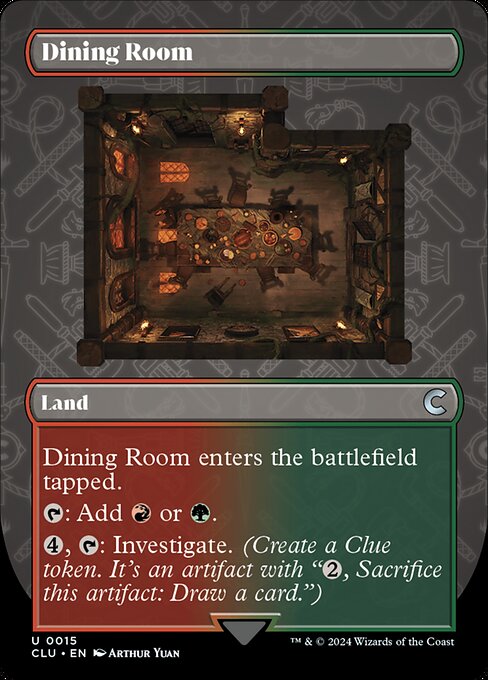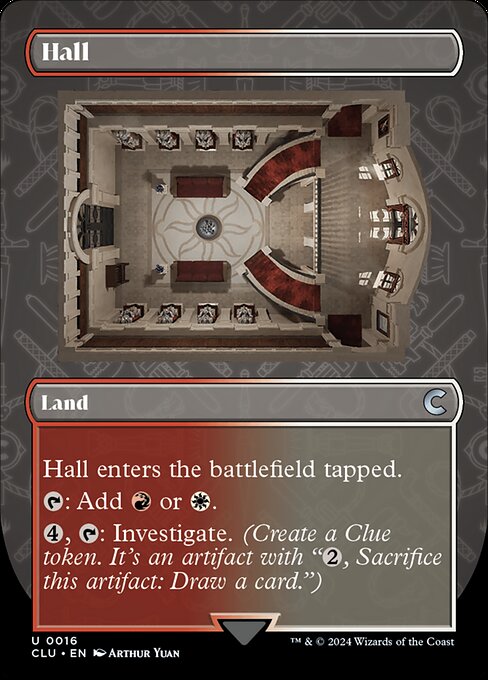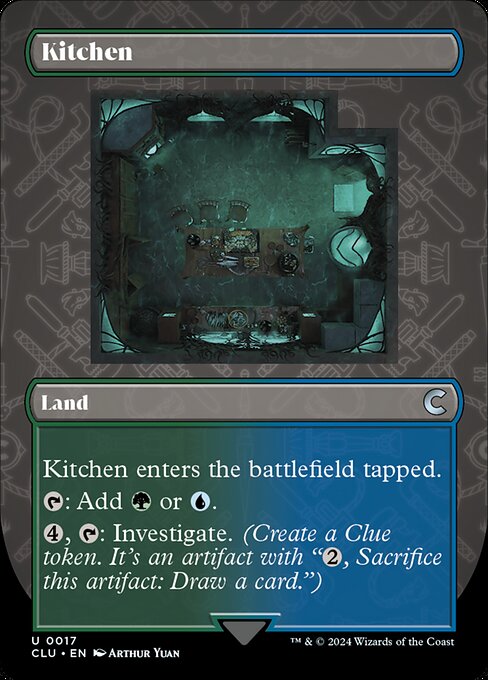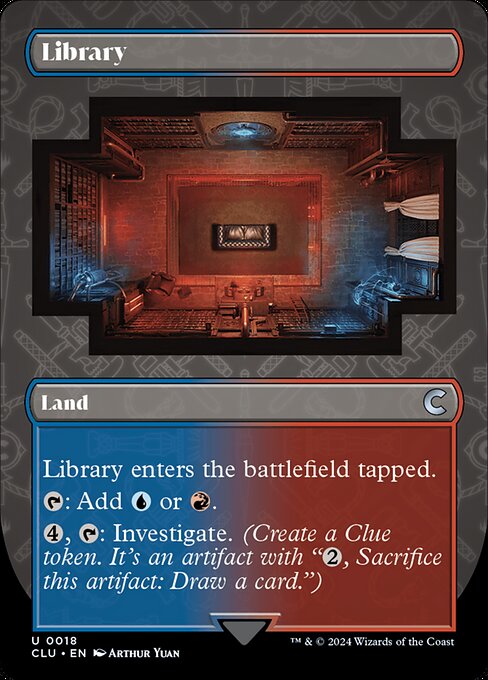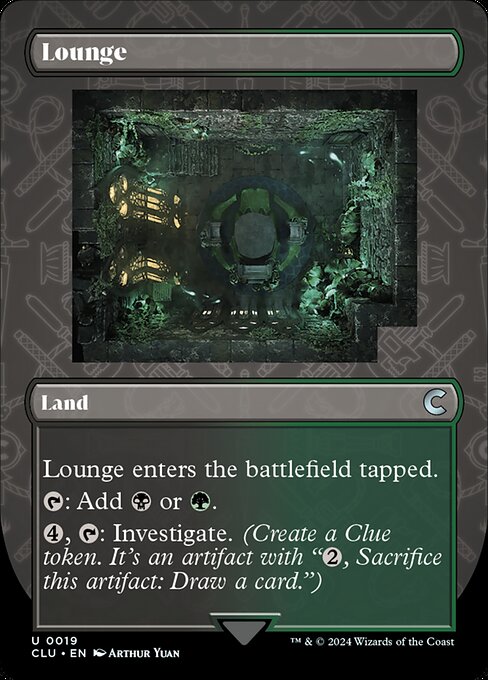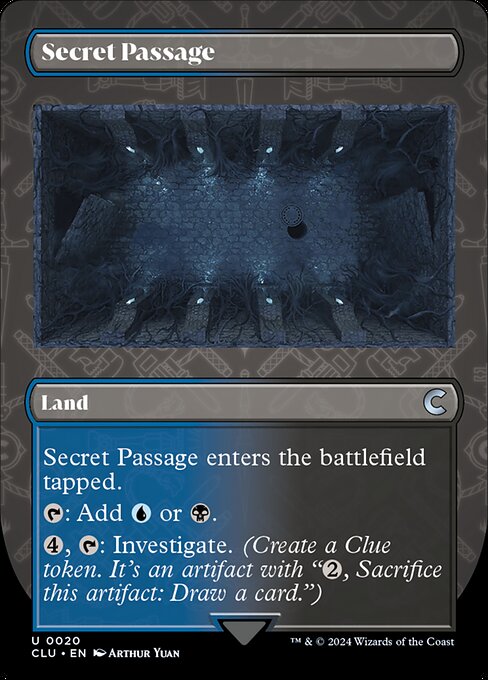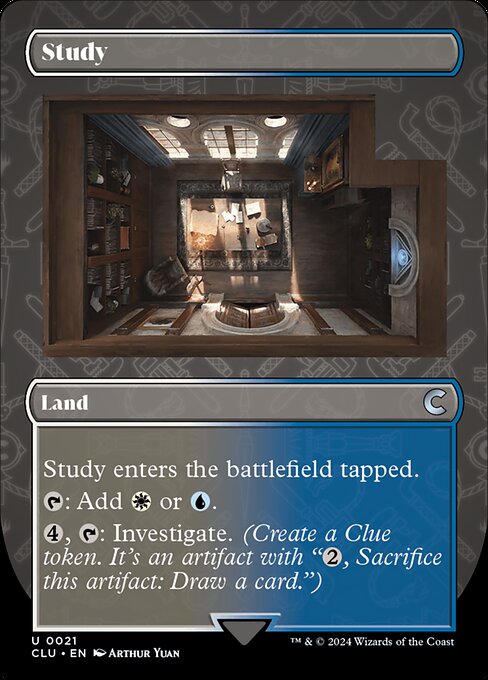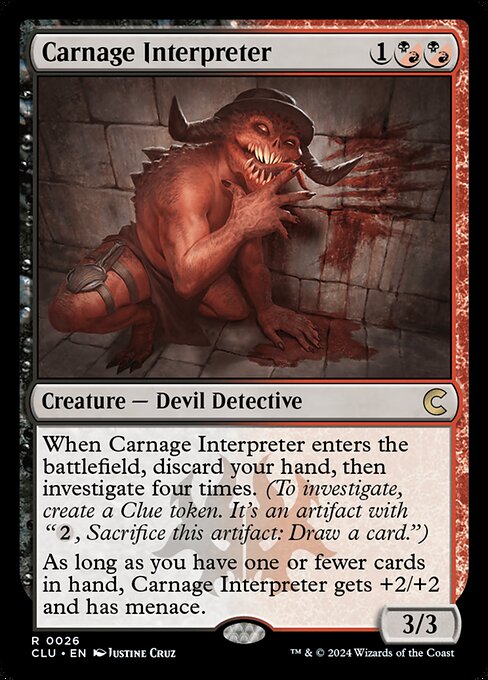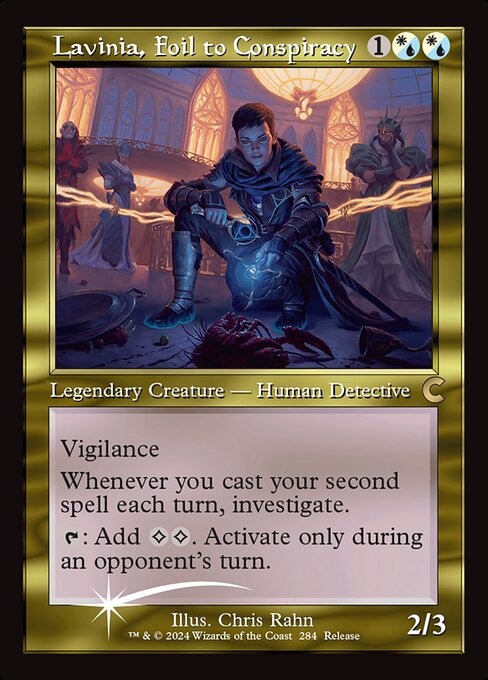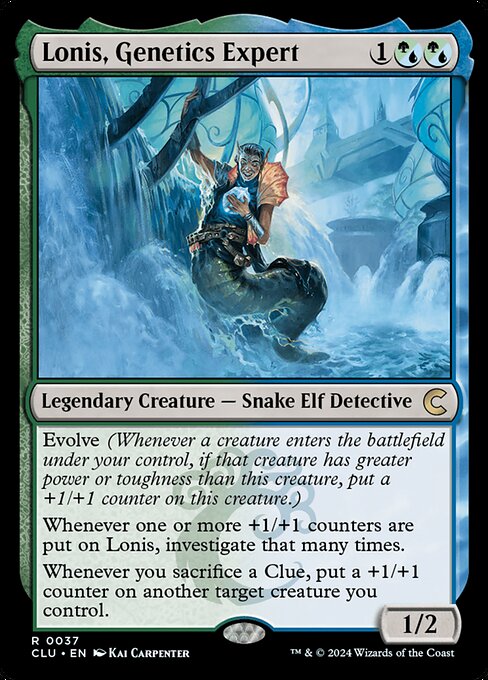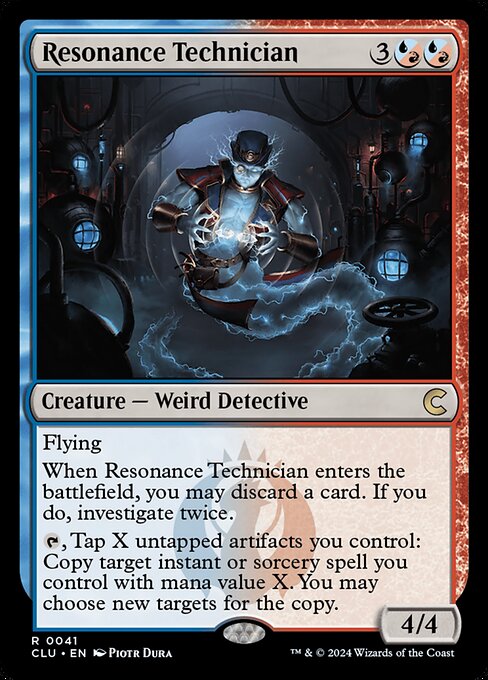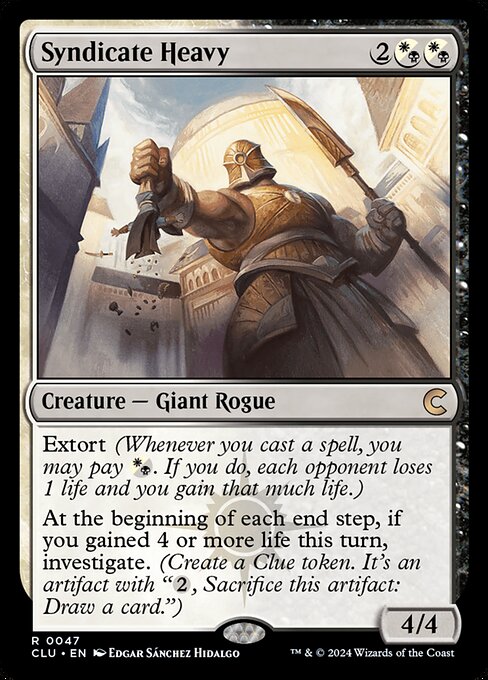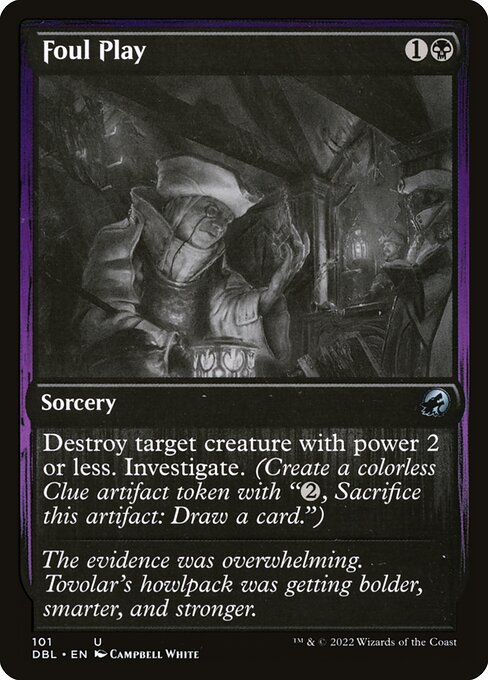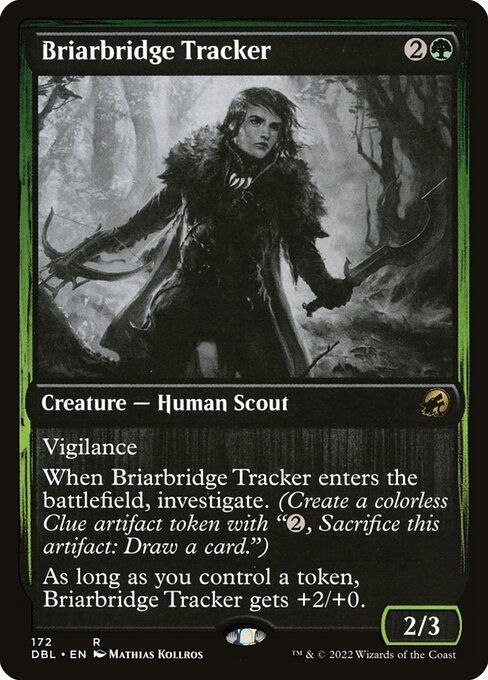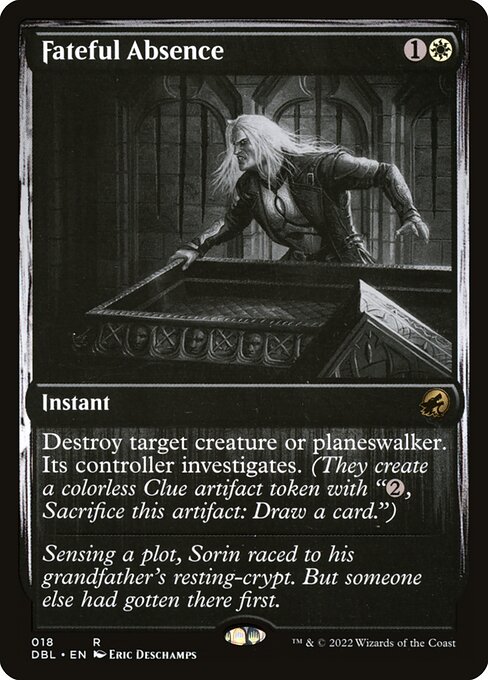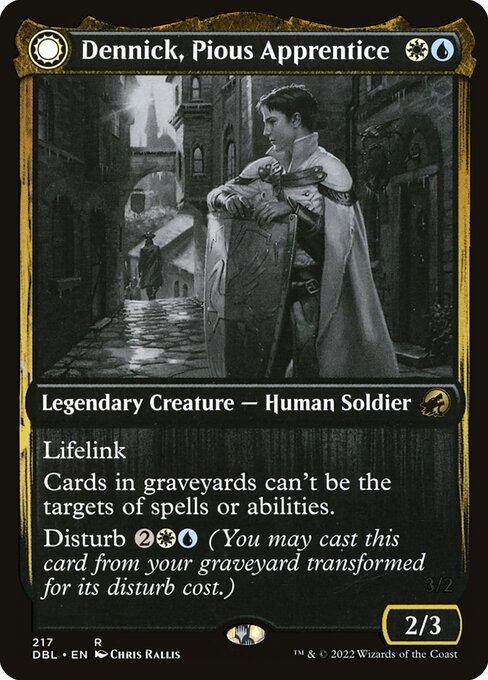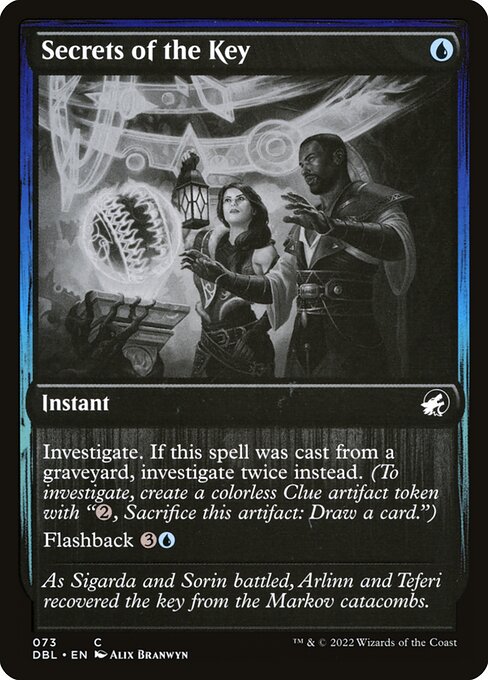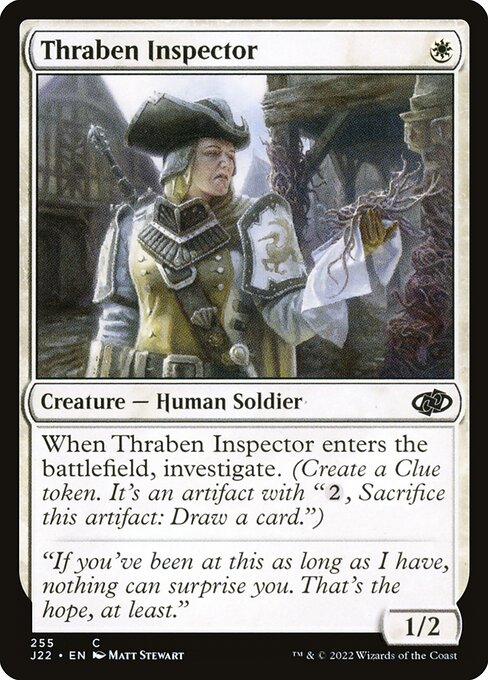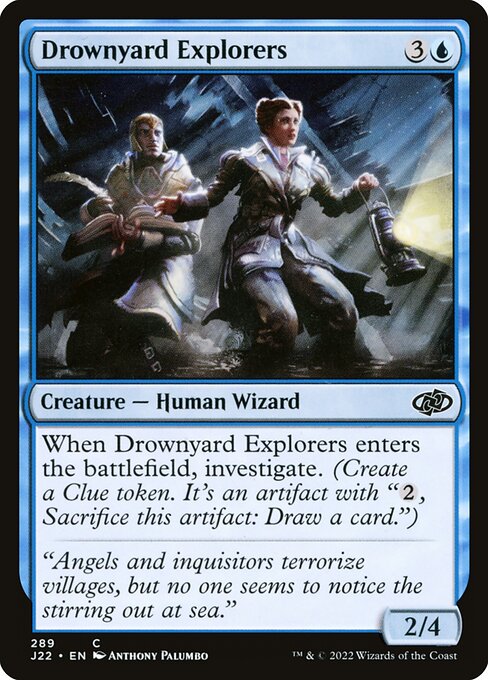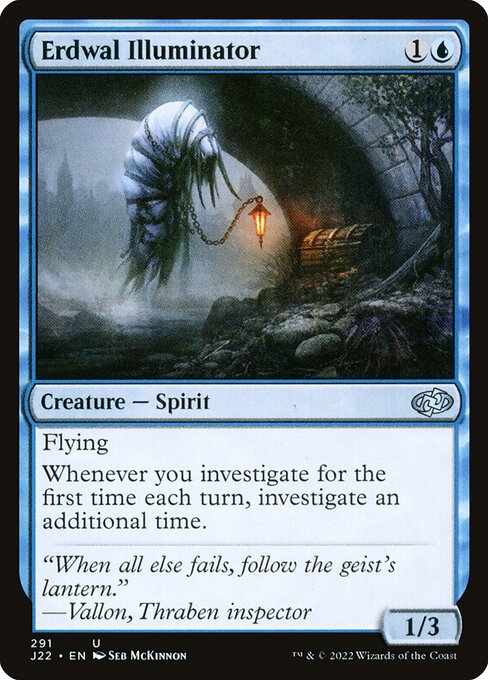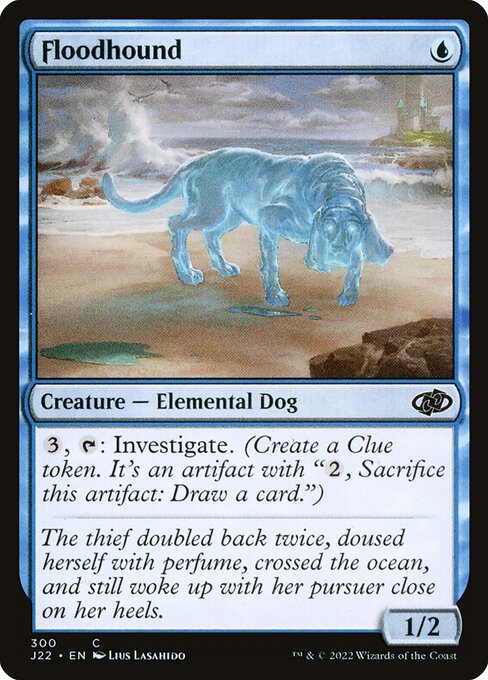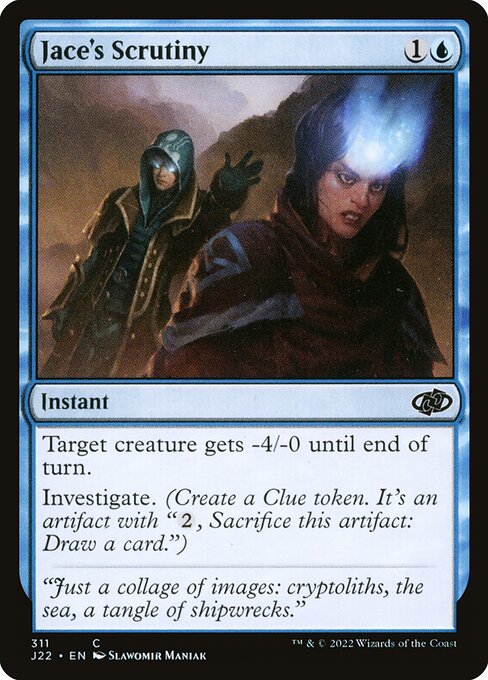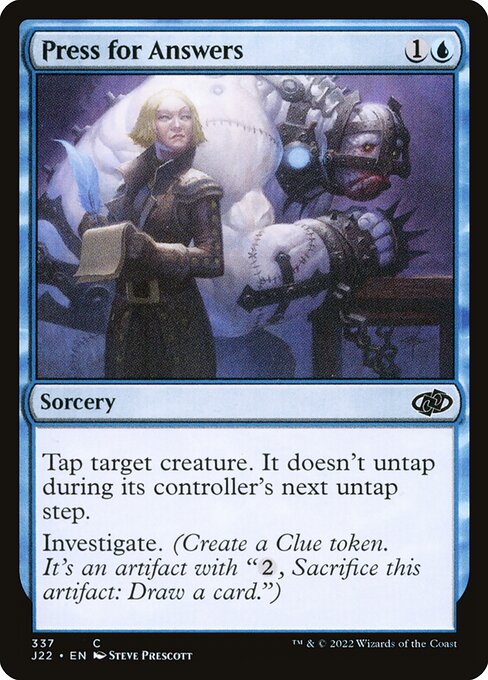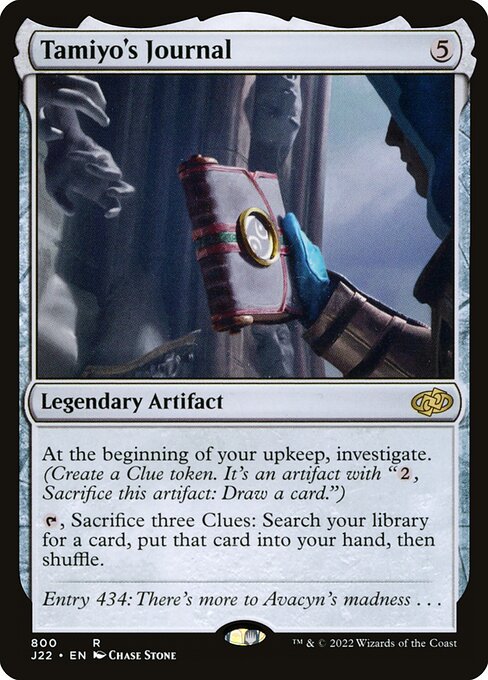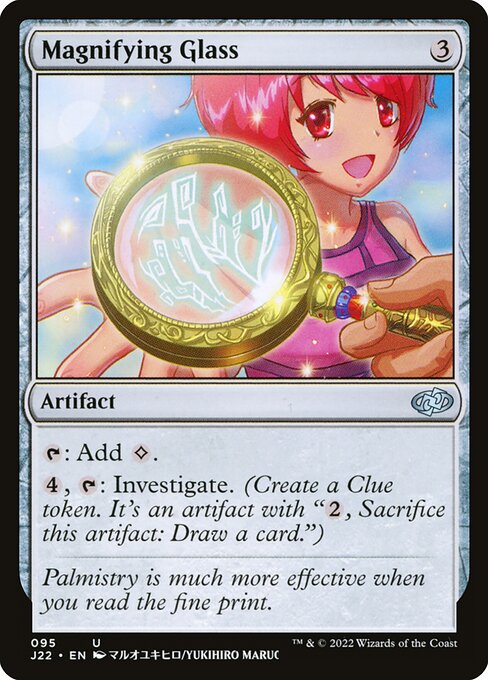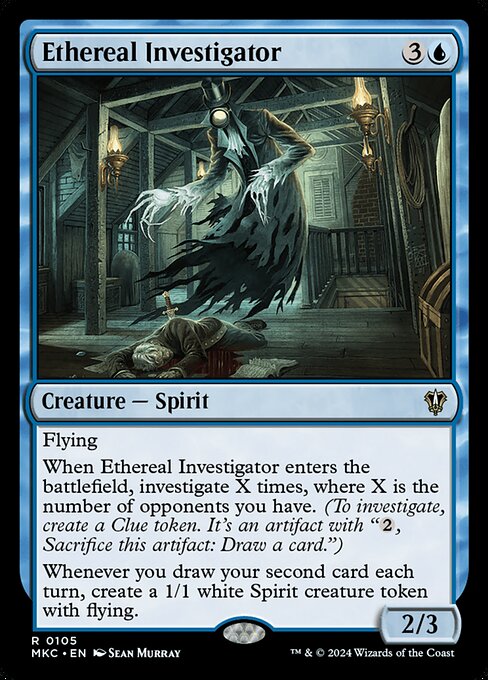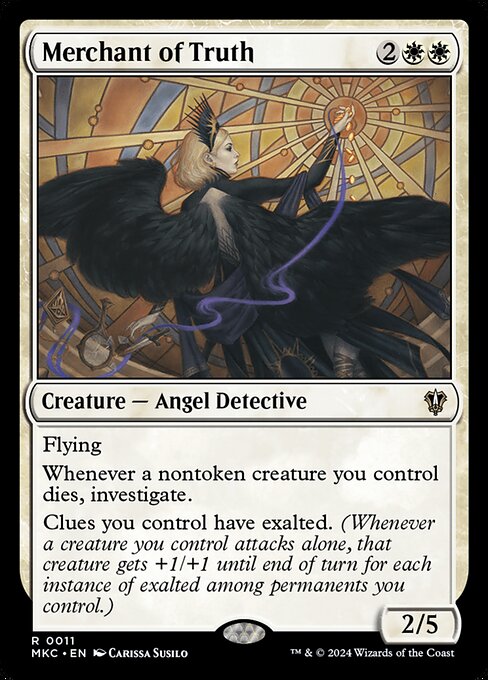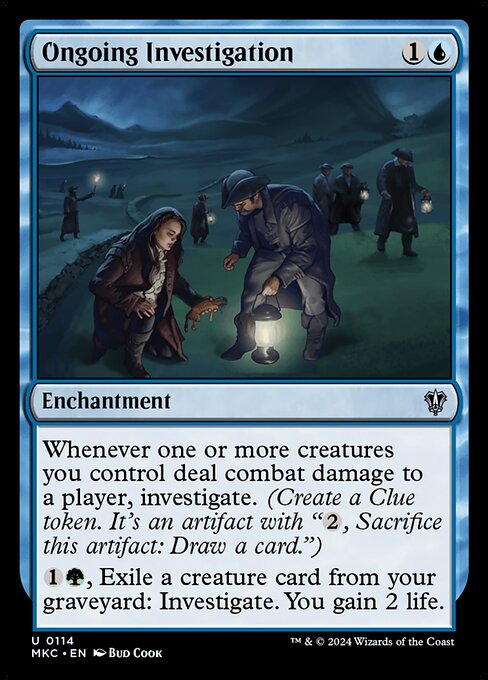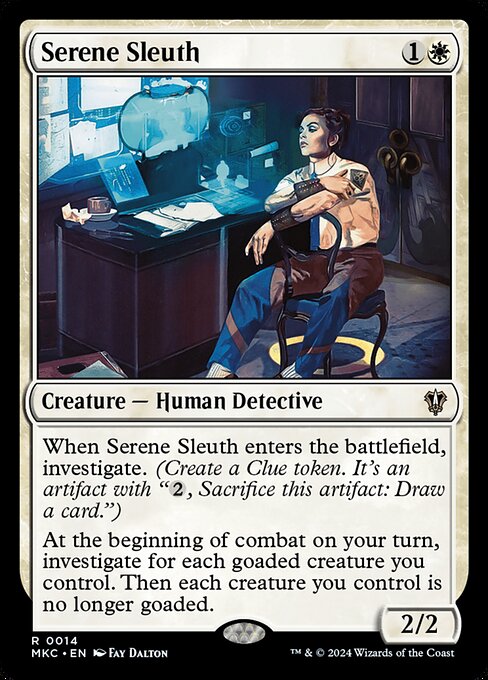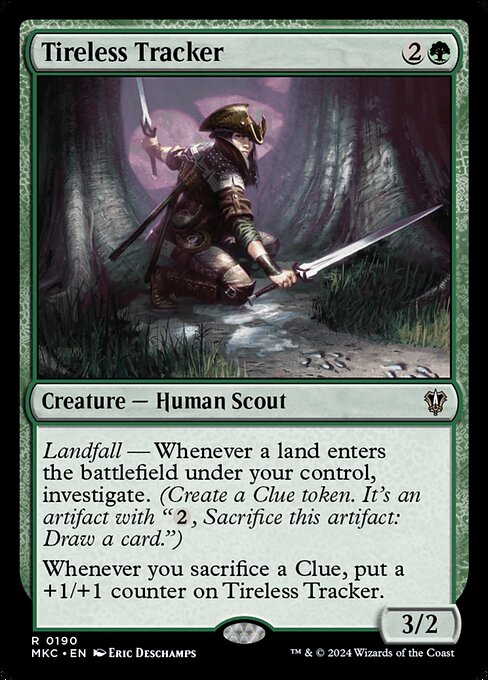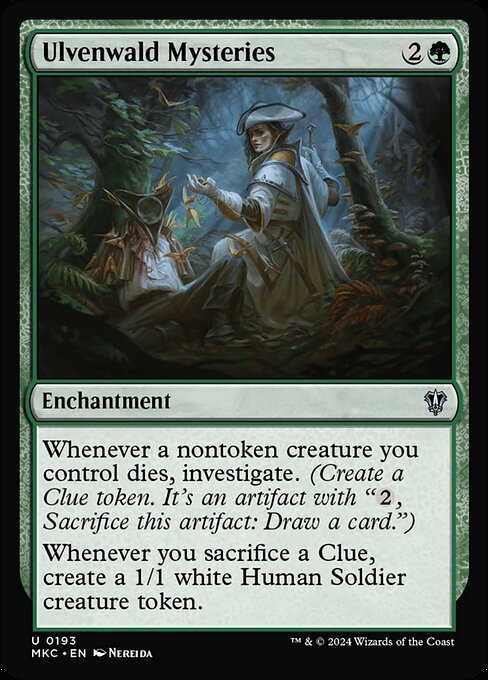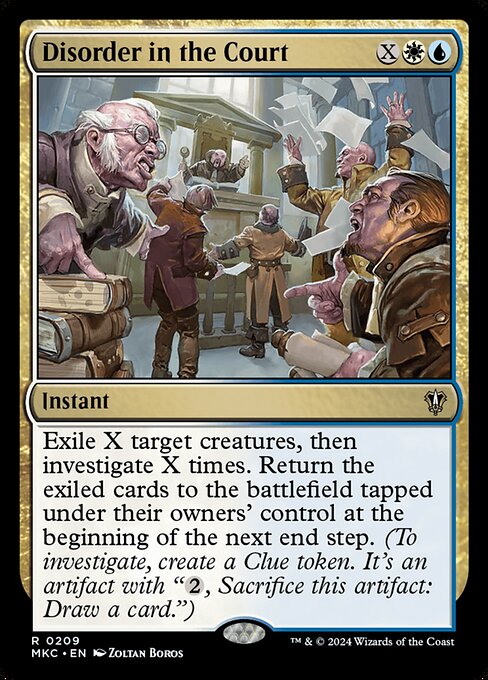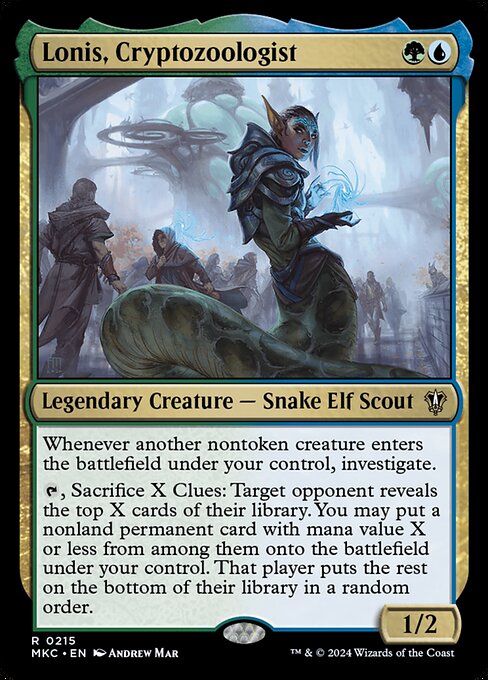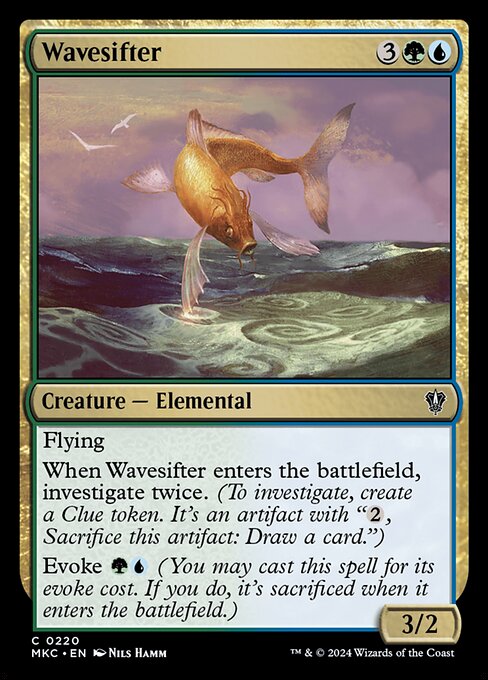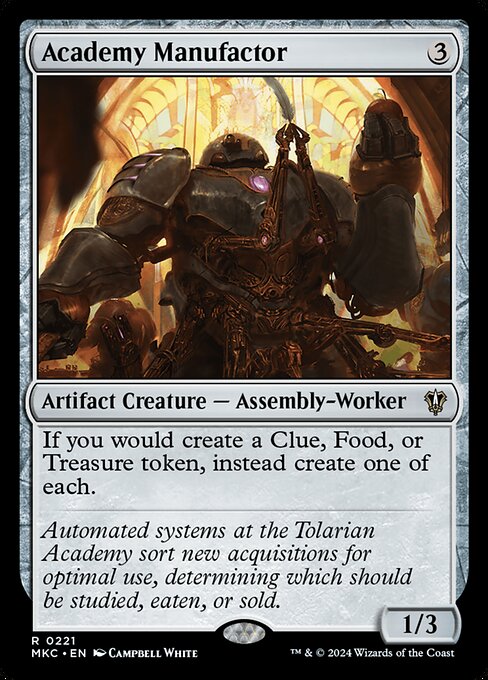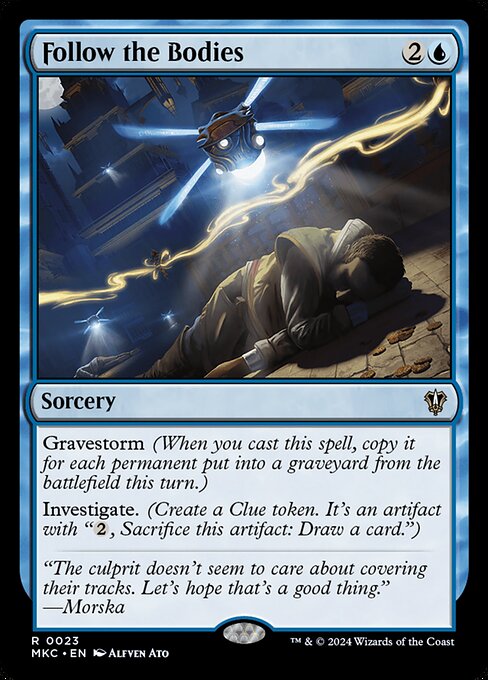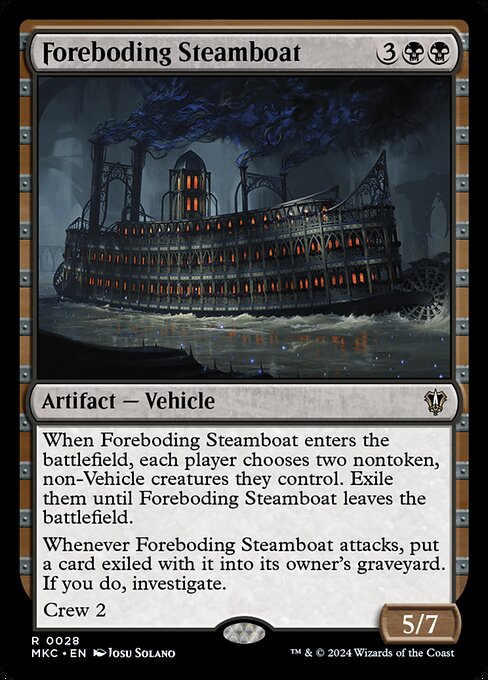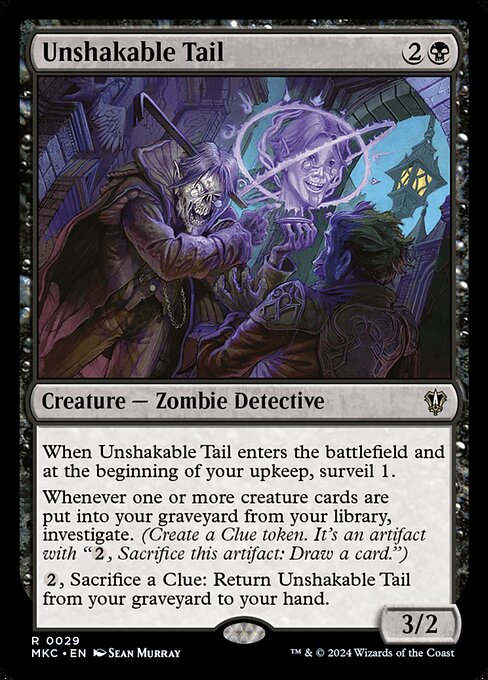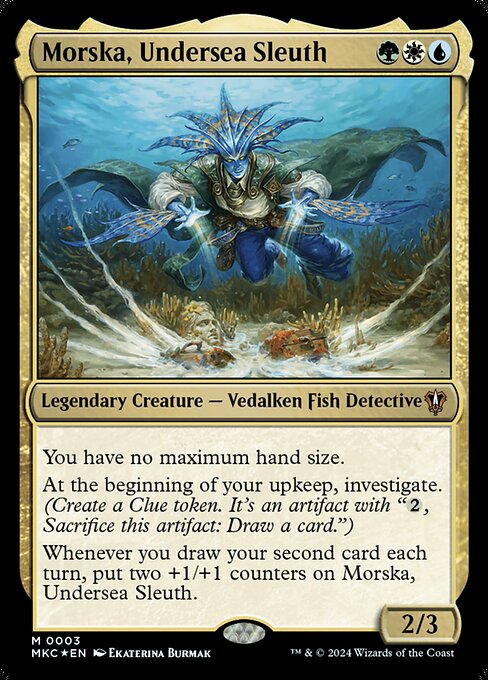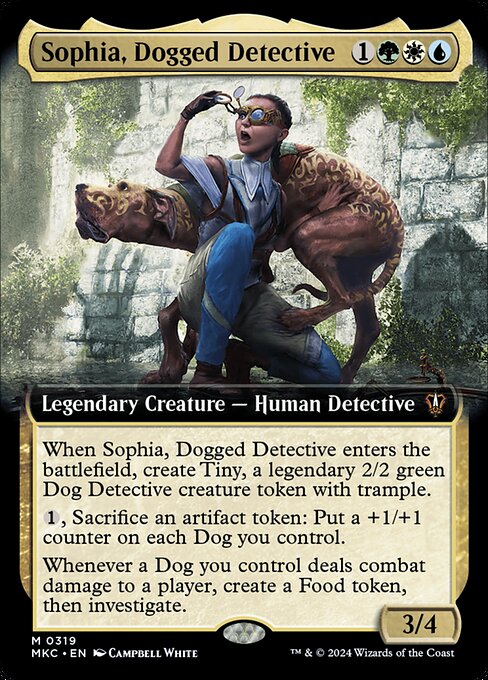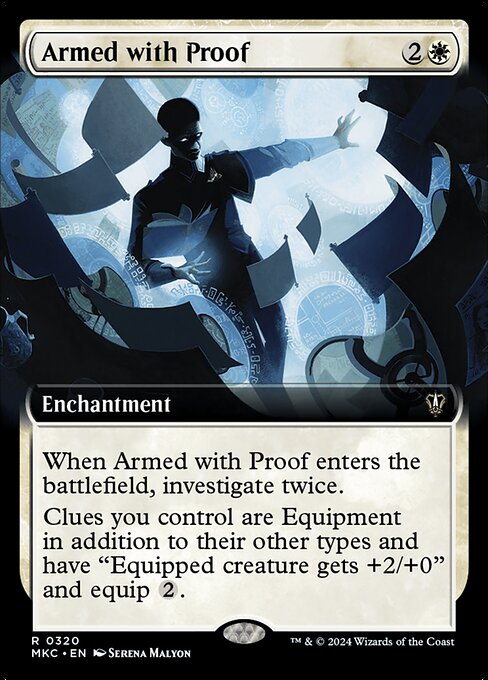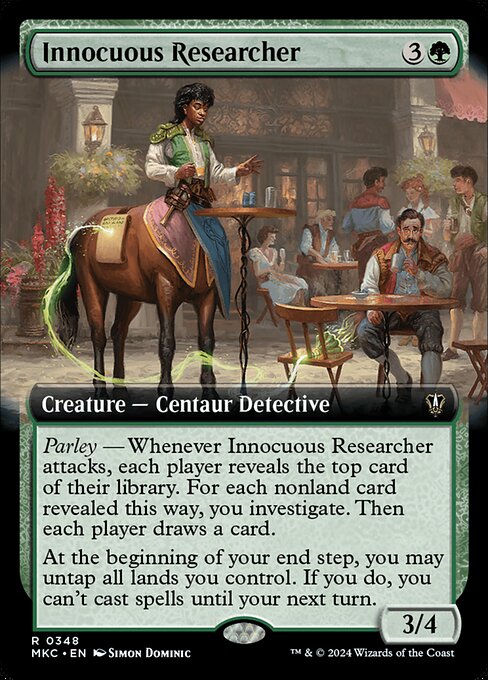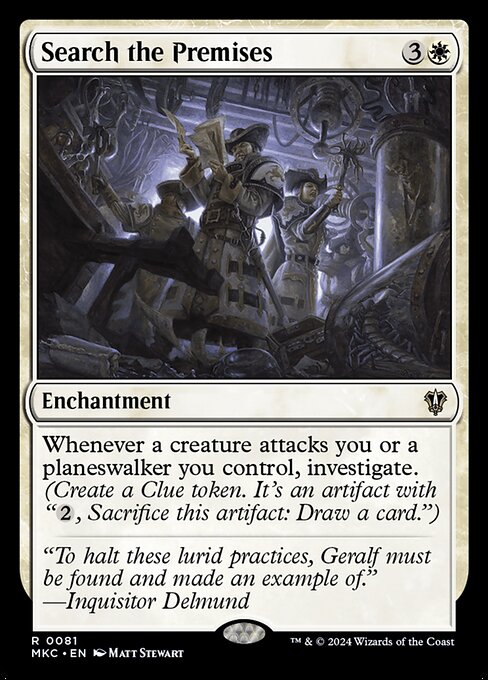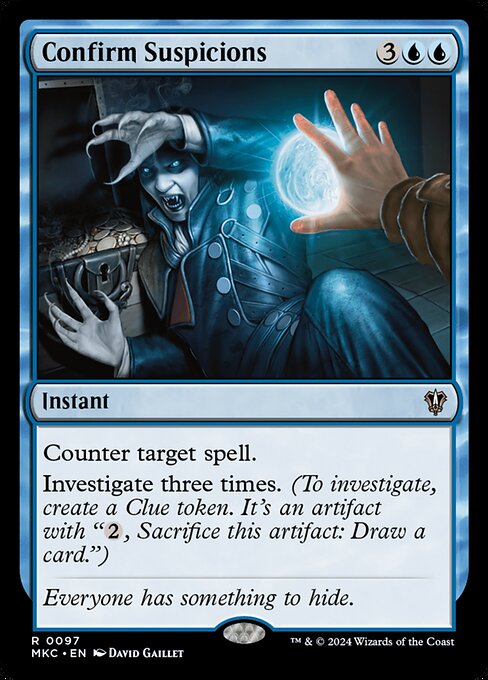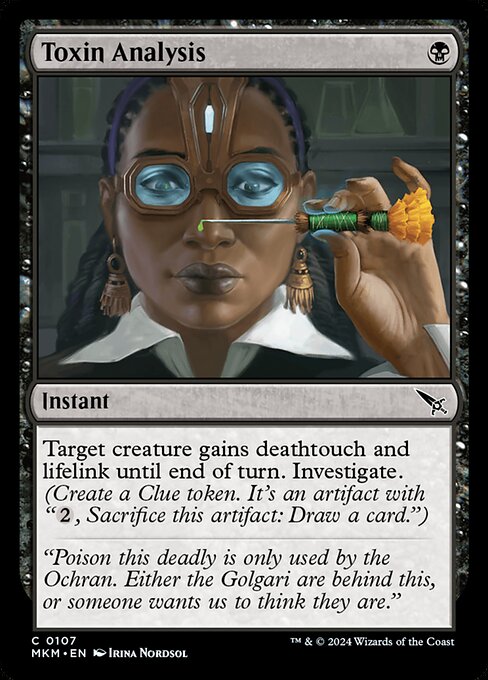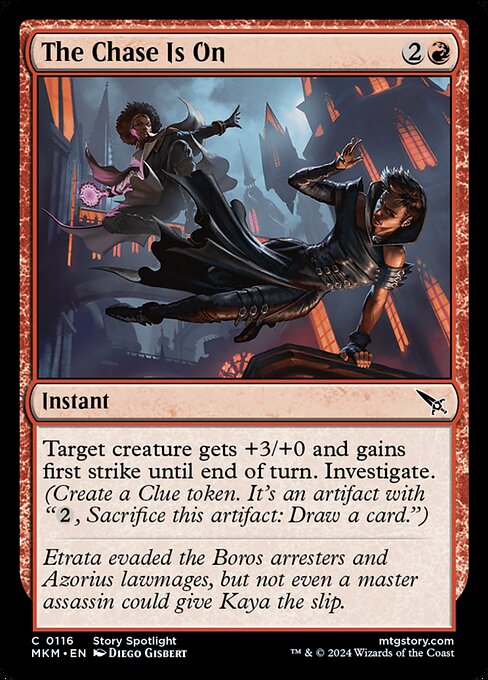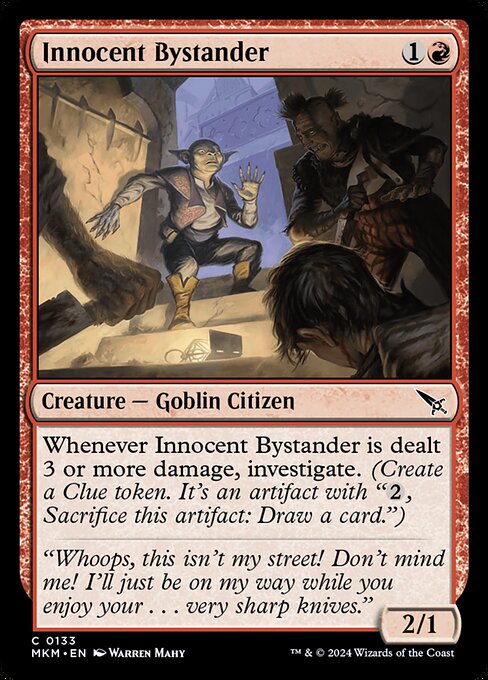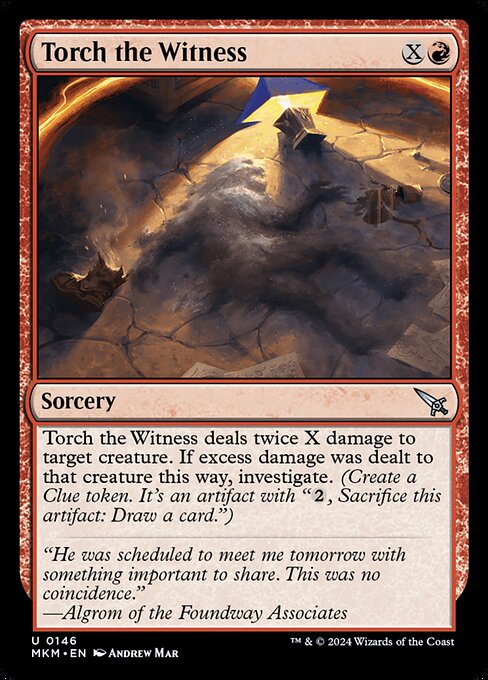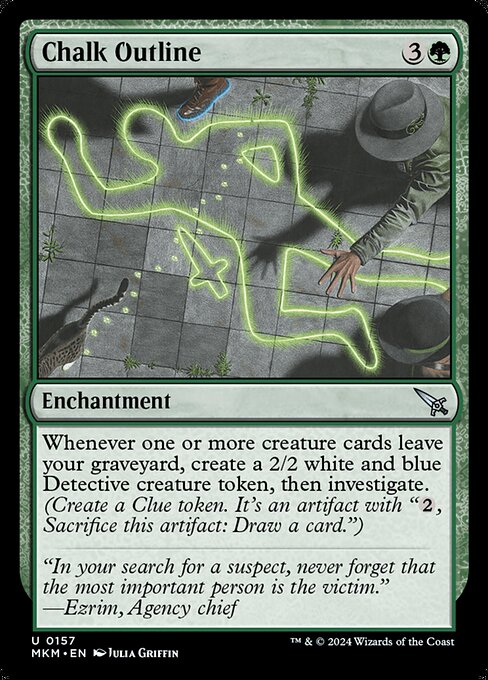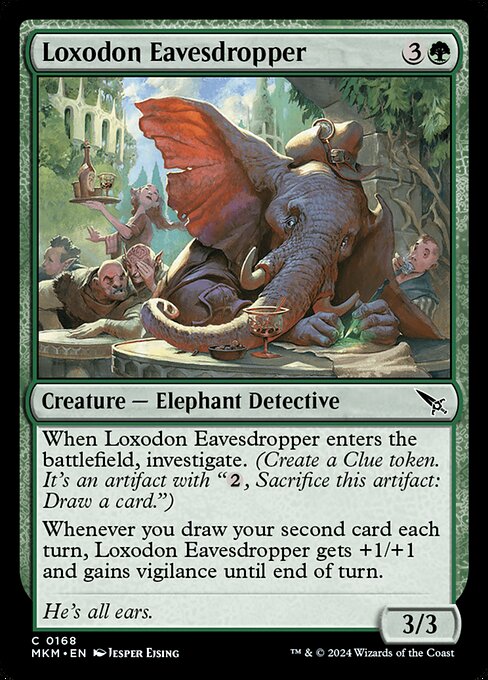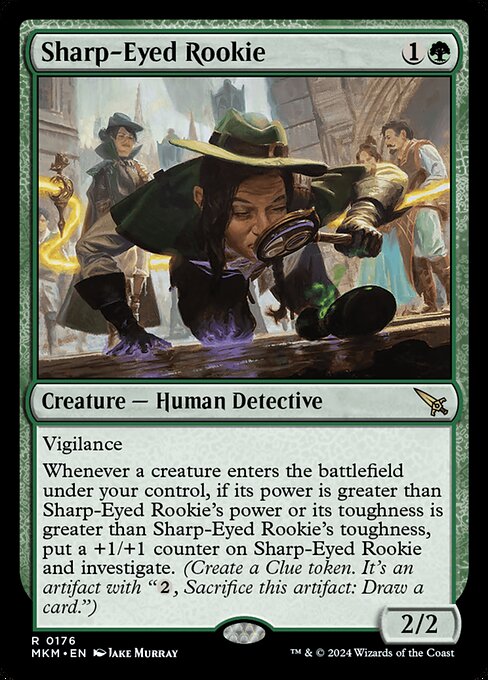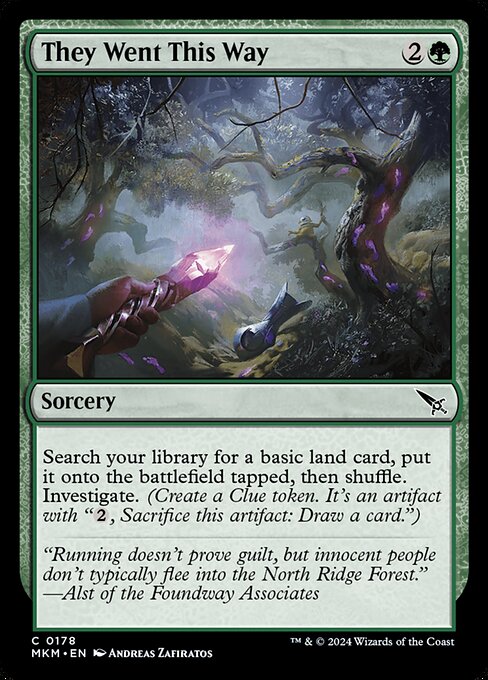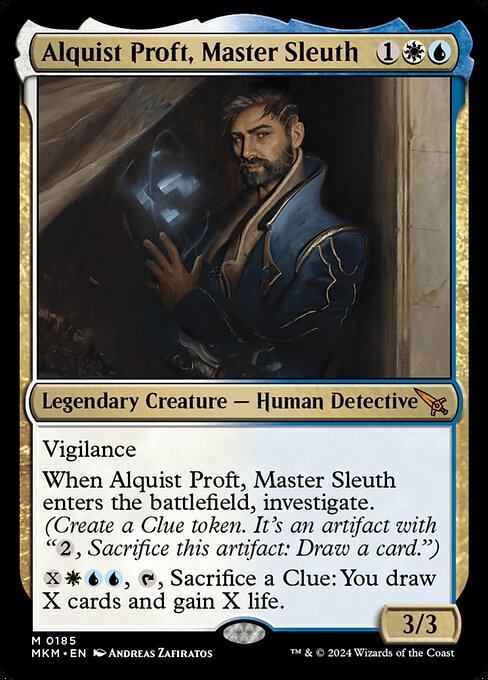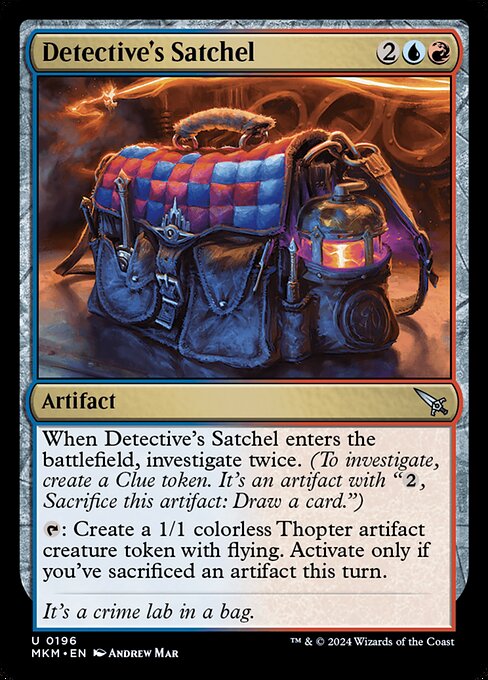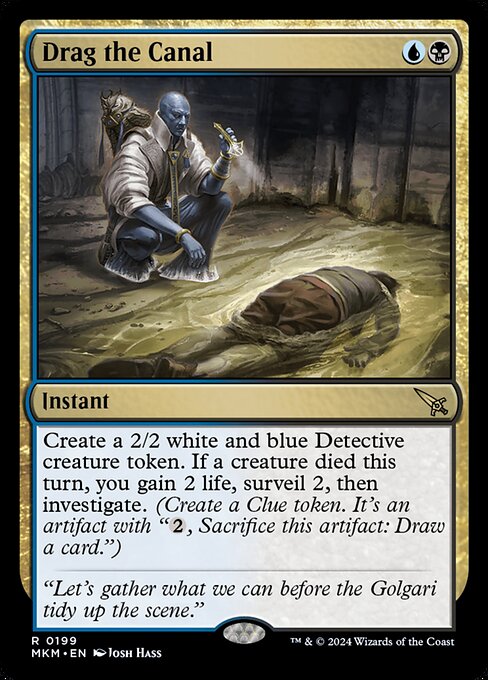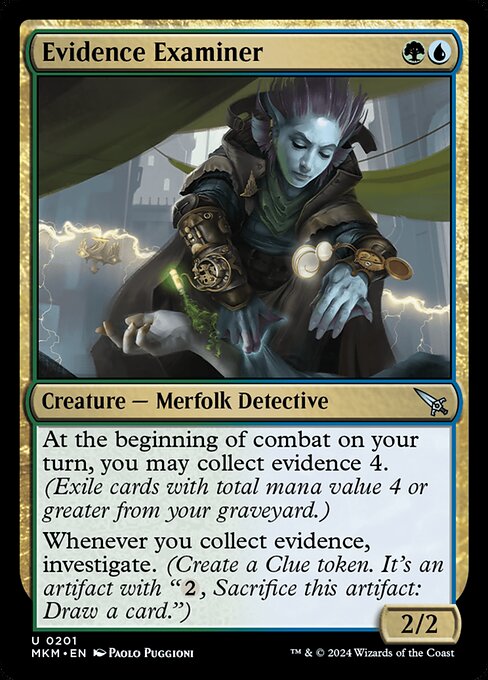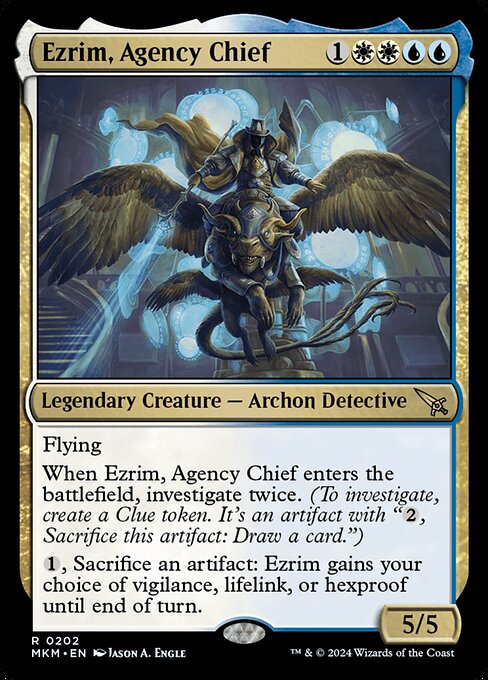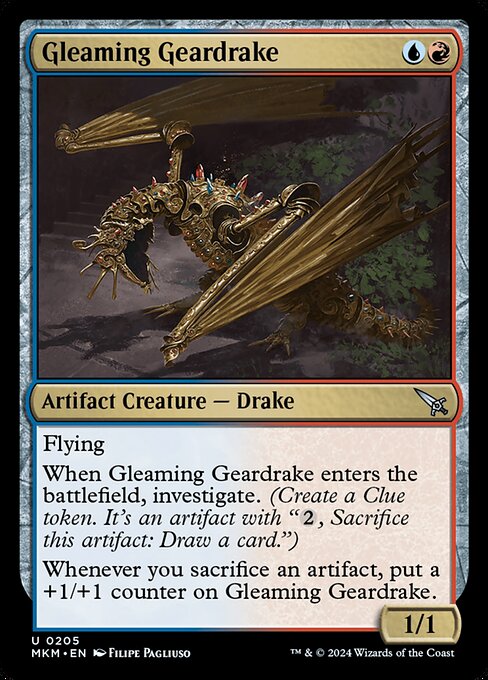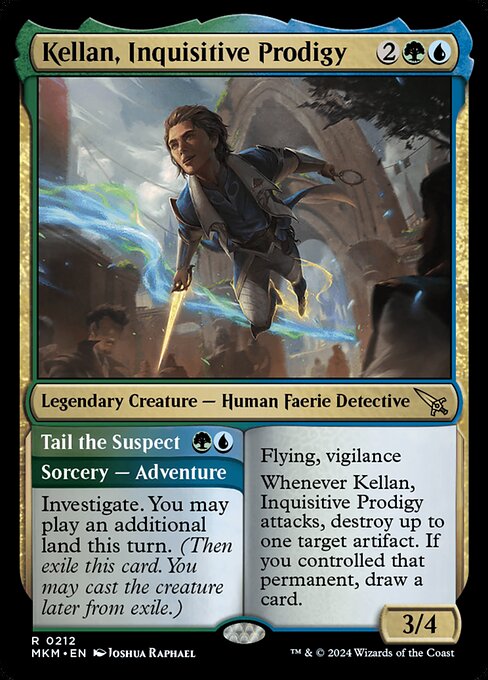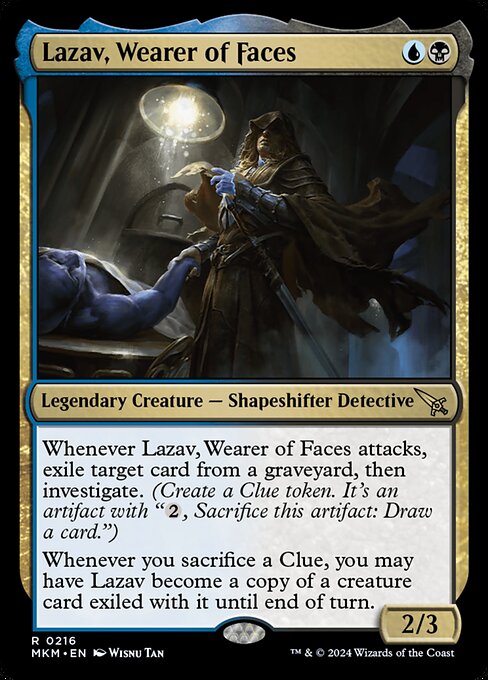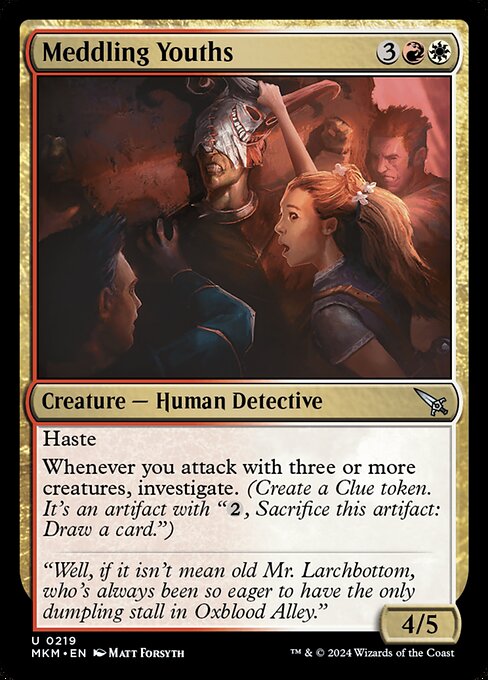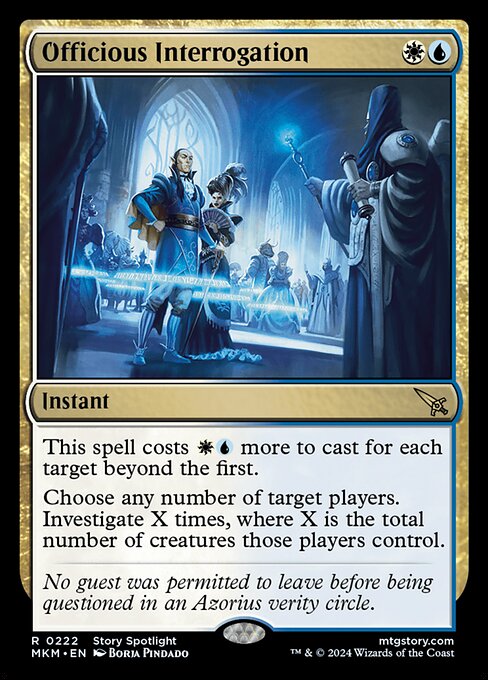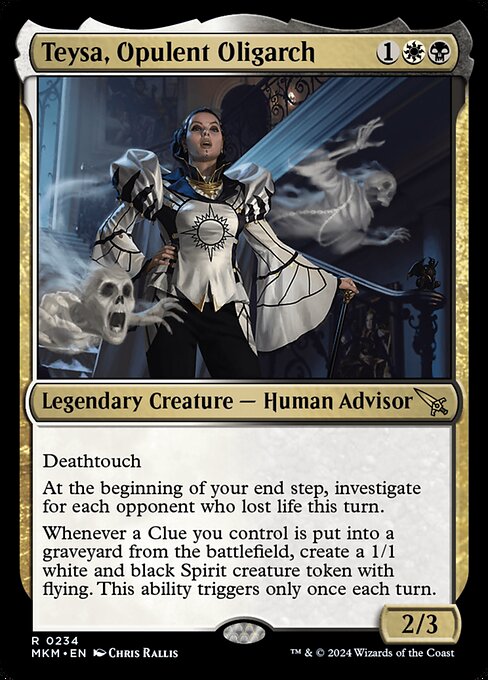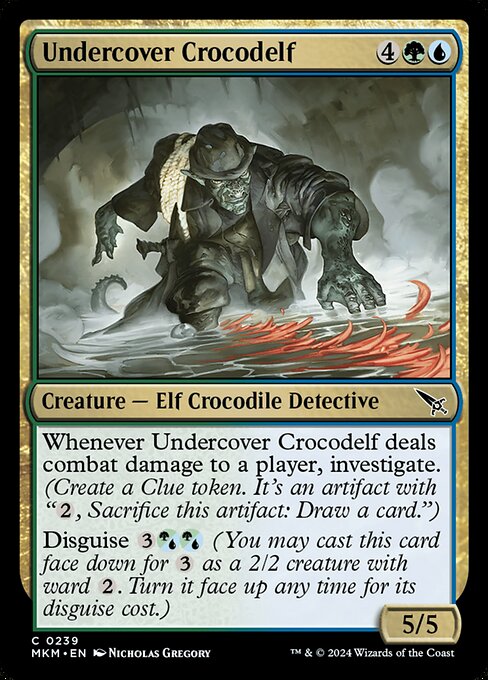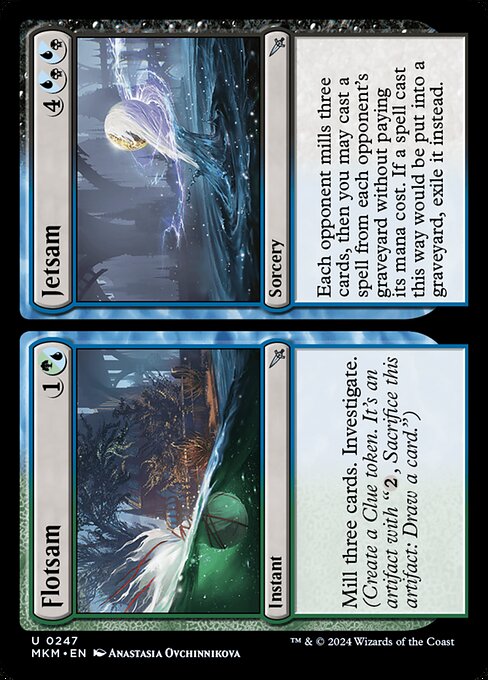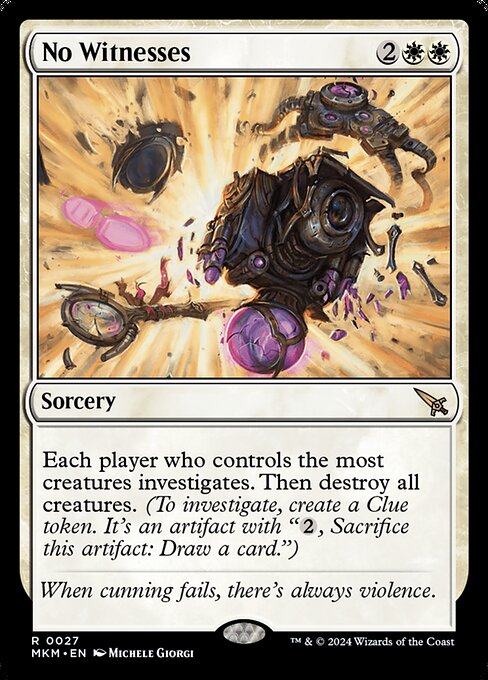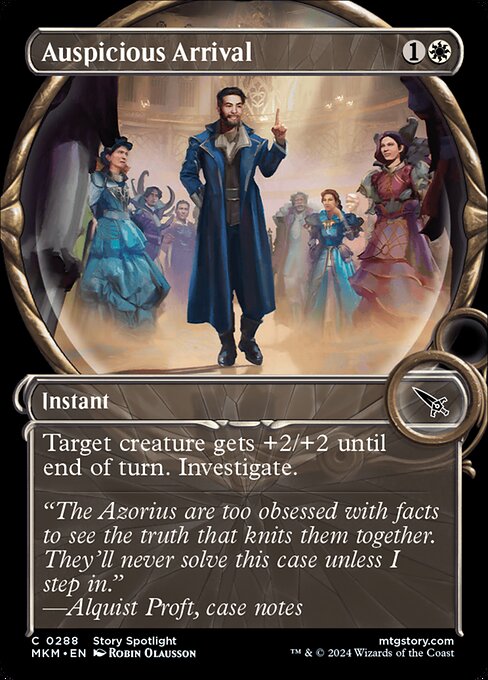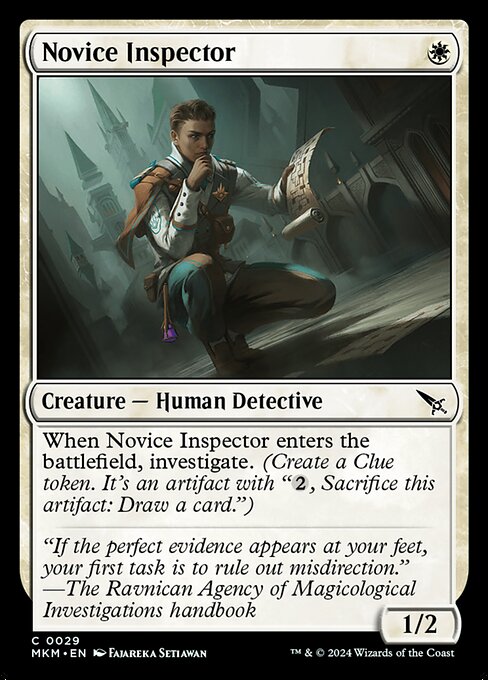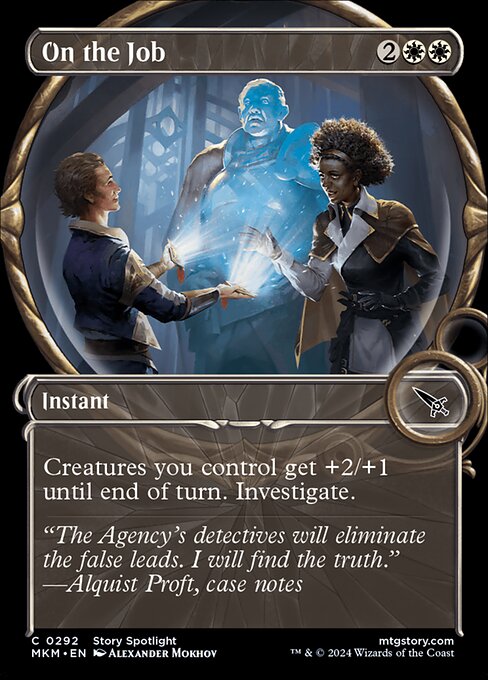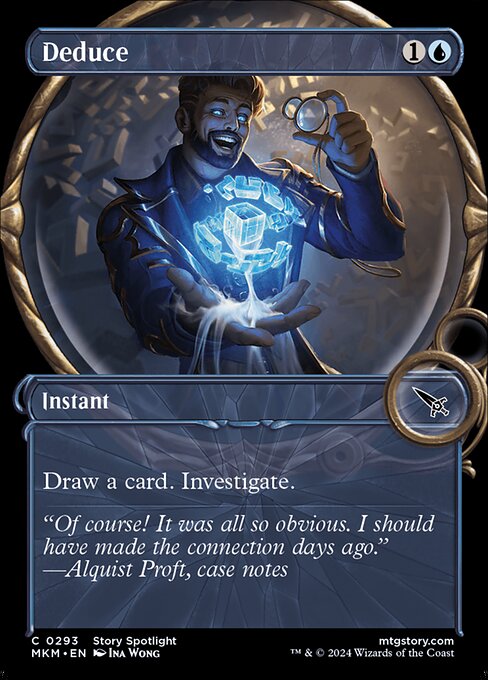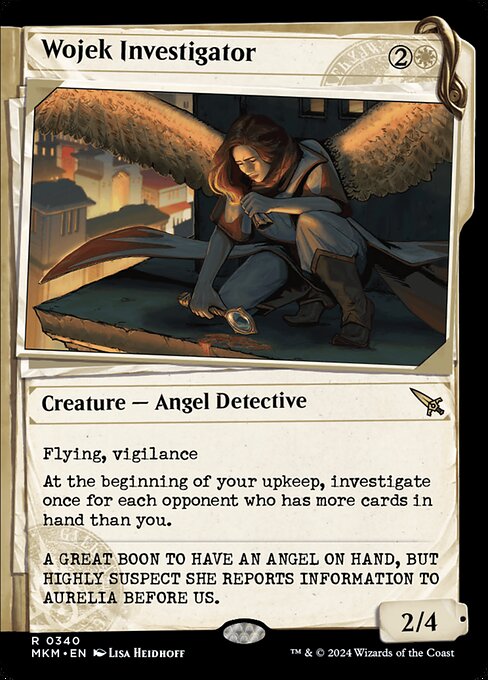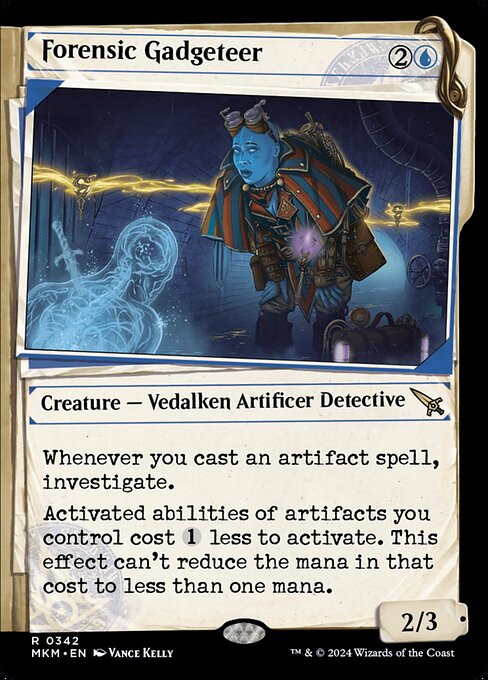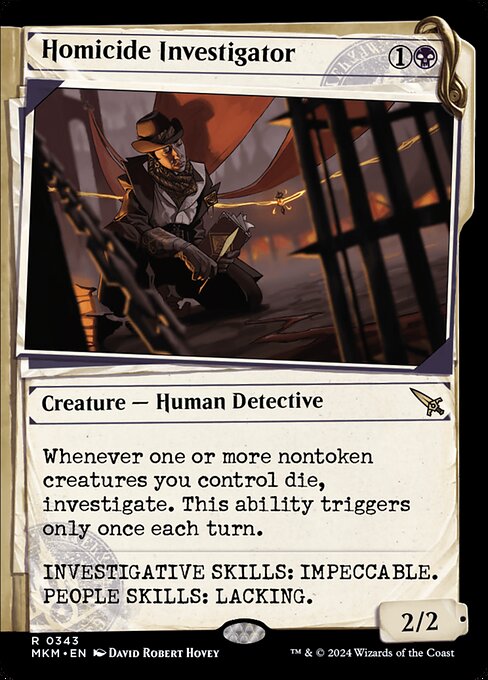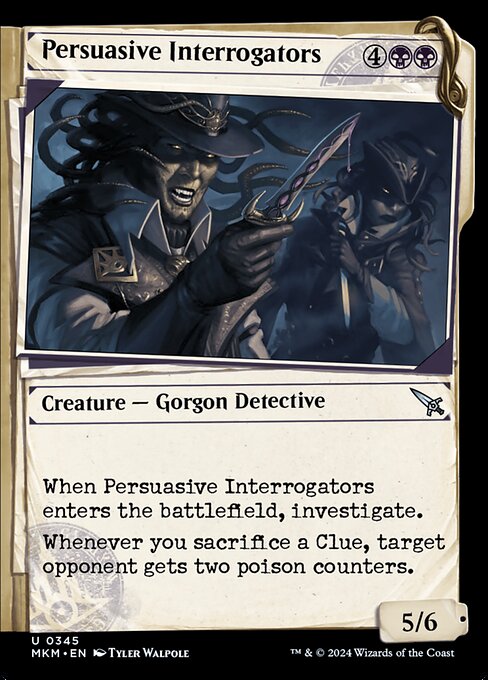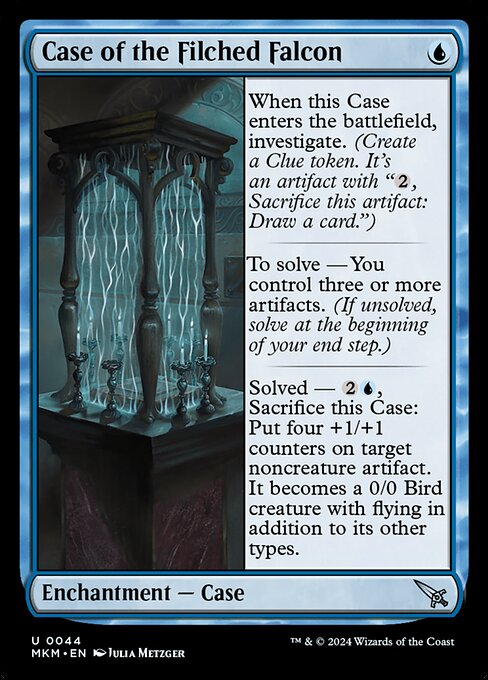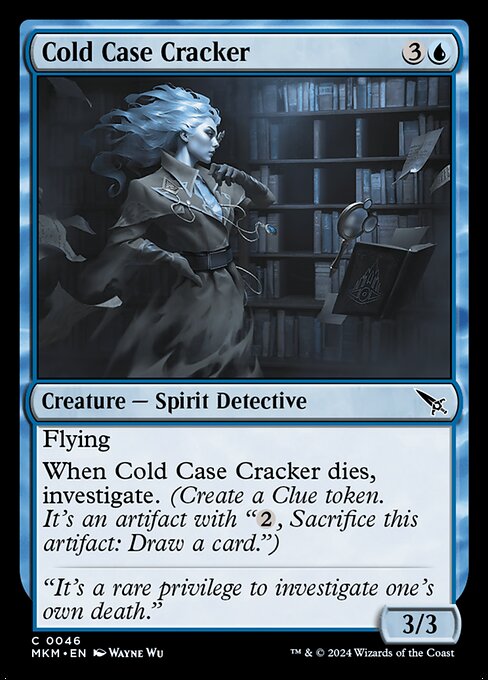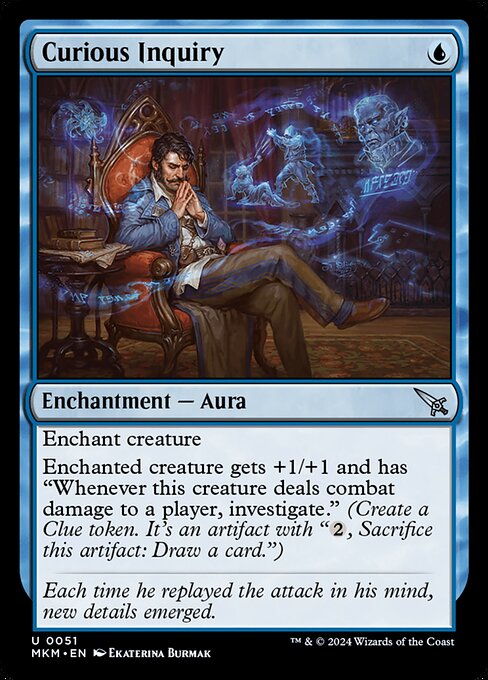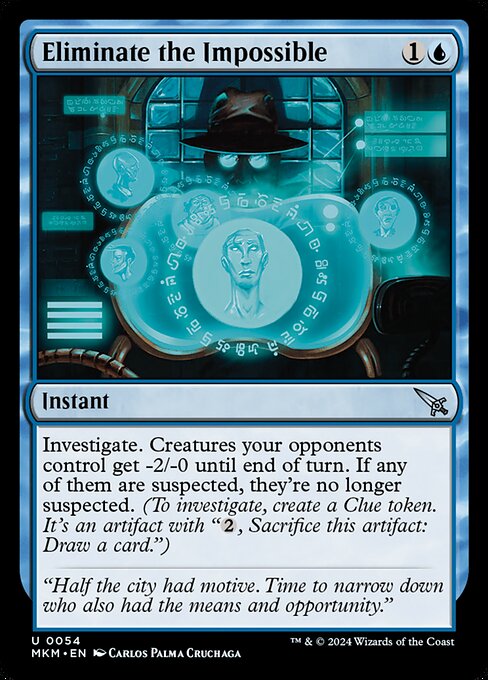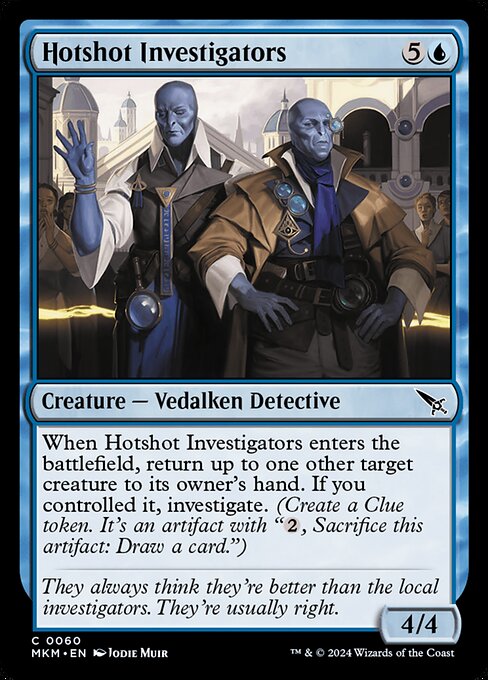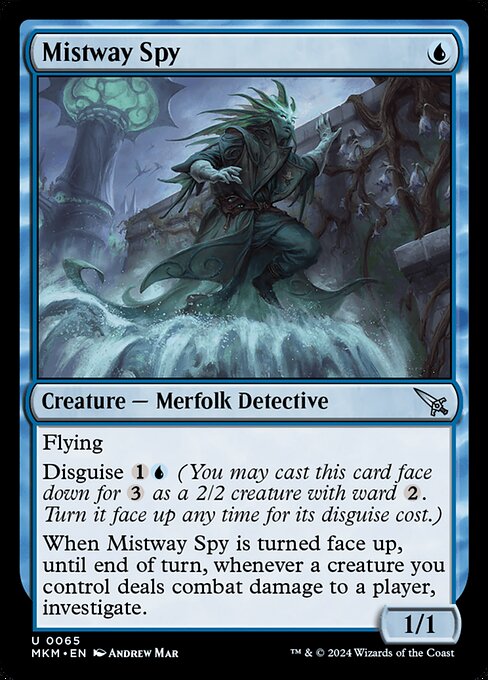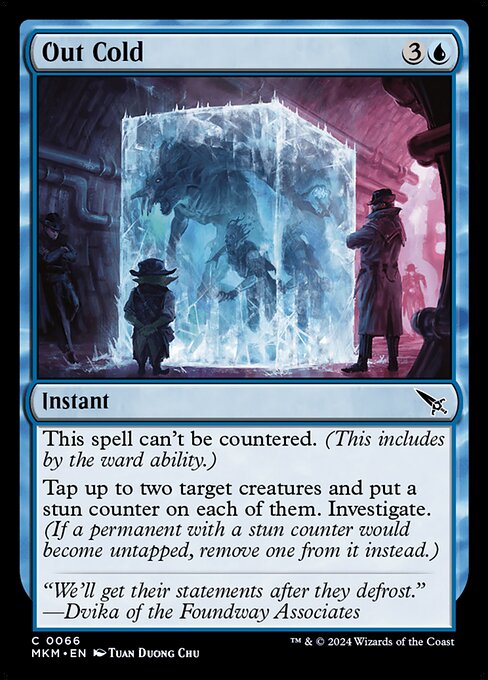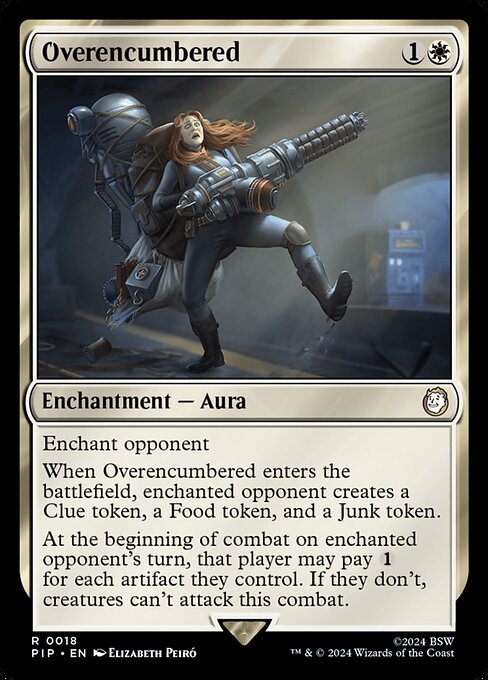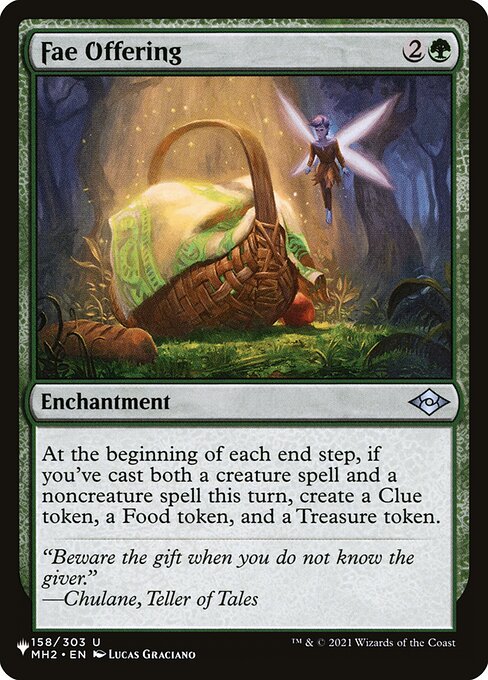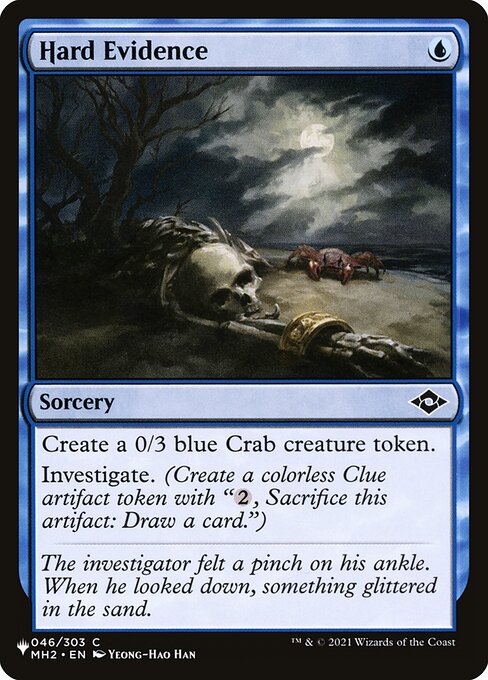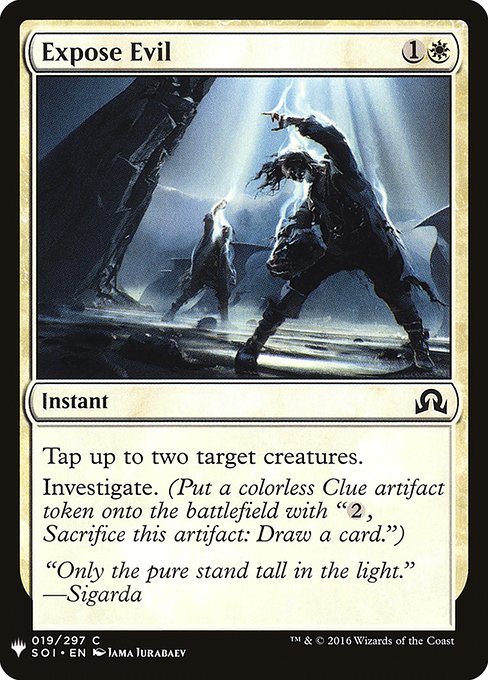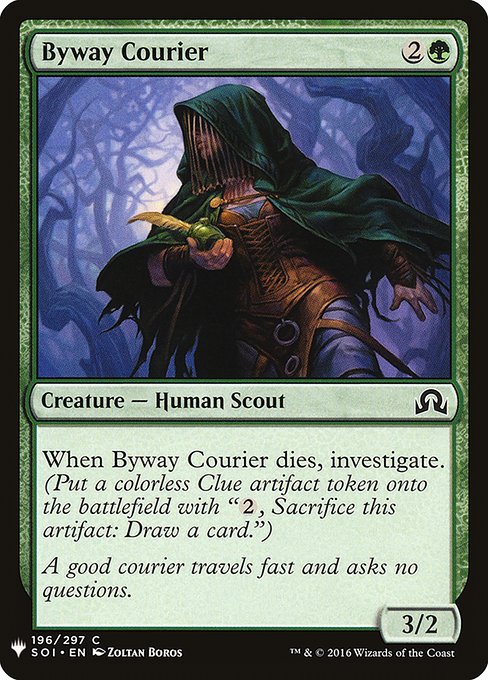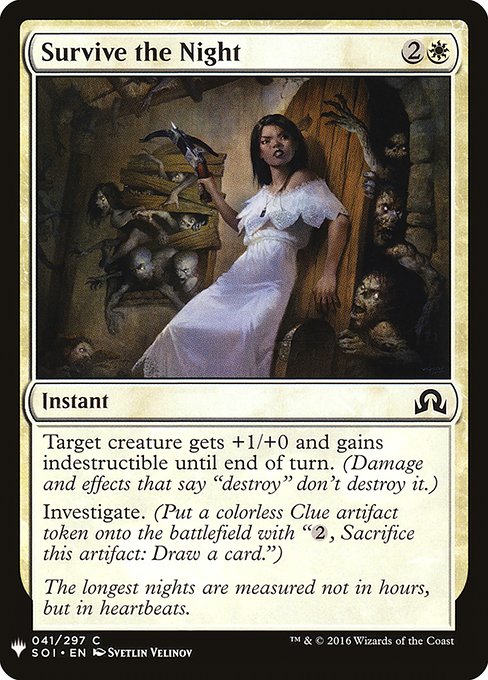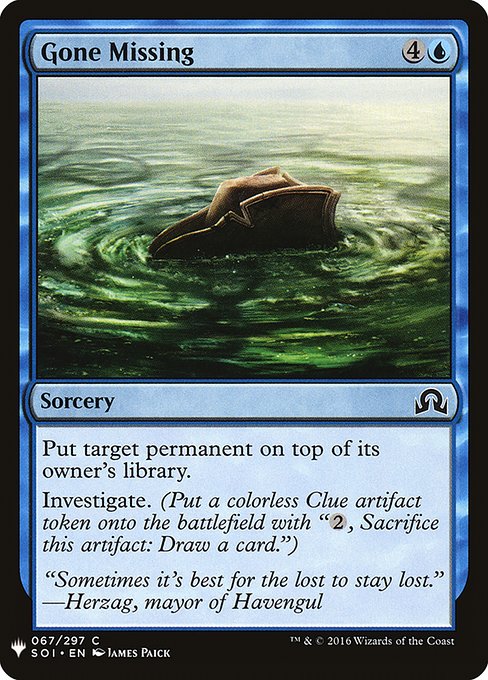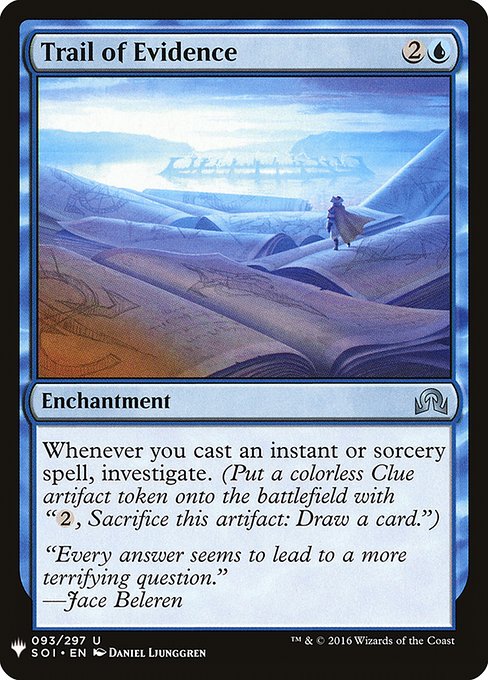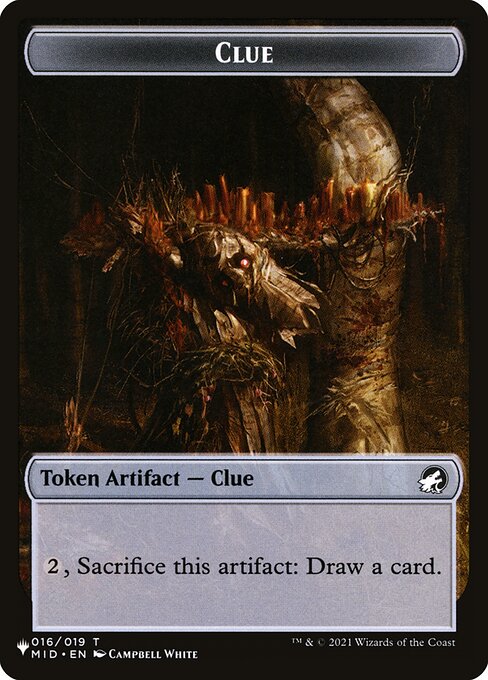Caso da Prova Furtada
Encantamento — Caso
Toda vez que um Detetive entrar no campo de batalha sob seu controle e toda vez que um Detetive que você controla for voltado para cima, coloque um marcador +1/+1 nele.
Para Solucionar — Você controla três ou mais Detetives. (Se o Caso não tiver sido solucionado, solucione-o no início de sua etapa final.)
Solucionado — Se uma ou mais fichas seriam criadas sob seu controle, em vez disso, são criadas aquelas fichas mais uma ficha de Pista. (Ela é um artefato com ", sacrifique este artefato: Compre um card".)
Para Solucionar — Você controla três ou mais Detetives. (Se o Caso não tiver sido solucionado, solucione-o no início de sua etapa final.)
Solucionado — Se uma ou mais fichas seriam criadas sob seu controle, em vez disso, são criadas aquelas fichas mais uma ficha de Pista. (Ela é um artefato com ", sacrifique este artefato: Compre um card".)
standard
future
historic
gladiator
pioneer
explorer
modern
legacy
pauper
vintage
penny
commander
brawl
alchemy
paupercommander
duel
oldschool
premodern
Rulings
Once a Case becomes solved, it stays solved until it leaves the battlefield.
“To Solve — [condition]” means “At the beginning of your end step, if [condition] and this Case is not solved, it becomes solved.”
Cases don’t lose their other abilities when they become solved.
You can’t sacrifice a Clue to pay multiple costs. For example, you can’t sacrifice a Clue token to activate its own ability and also to activate Alquist Proft, Master Sleuth’s ability.
Some spells and abilities that investigate may require targets. If each target chosen is an illegal target as that spell or ability tries to resolve, it won’t resolve. You won’t create any Clue tokens.
“Solved — [static ability]” means “As long as this Case is solved, [static ability].” Static abilities are written as statements, such as “Creatures you control get +1/+1” or “Instant and sorcery spells you cast cost less to cast.”
“Solved — [Triggered ability]” means “[Triggered ability]. This ability triggers only if this Case is solved.” Triggered abilities use the word “when,” “whenever,” or “at.” They’re often written as “[Trigger condition], [effect].”
Being solved is not part of a permanent’s copiable values. A permanent that becomes a copy of a solved Case is not solved. A solved Case that somehow becomes a copy of a different Case stays solved.
Clue is an artifact type. Even though it appears on some cards with other permanent types, it’s never a creature type, a land type, or anything but an artifact type.
“To solve” abilities will check for their condition twice: once when the ability would trigger, and once when it resolves. If the condition isn’t true at the beginning of your end step, the ability won’t trigger at all. If the condition isn’t true when the ability resolves, the Case won’t become solved.
The meaning of “solved” differs based on what type of ability follows it. “Solved — [activated ability]” means “[Activated ability]. Activate only if this Case is solved.” Activated abilities contain a colon. They’re generally written “[Cost]: [Effect].”
Each Case has two special keyword abilities: to solve and solved.
If an effect refers to a Clue, it means any Clue artifact, not just a Clue artifact token. For example, you can sacrifice Wrench to pay for Alquist Proft, Master Sleuth’s activated ability.
Some abilities trigger “whenever you sacrifice a Clue”. Those abilities trigger whenever you sacrifice a Clue for any reason, not just to activate a Clue’s activated ability.
“To Solve — [condition]” means “At the beginning of your end step, if [condition] and this Case is not solved, it becomes solved.”
Cases don’t lose their other abilities when they become solved.
You can’t sacrifice a Clue to pay multiple costs. For example, you can’t sacrifice a Clue token to activate its own ability and also to activate Alquist Proft, Master Sleuth’s ability.
Some spells and abilities that investigate may require targets. If each target chosen is an illegal target as that spell or ability tries to resolve, it won’t resolve. You won’t create any Clue tokens.
“Solved — [static ability]” means “As long as this Case is solved, [static ability].” Static abilities are written as statements, such as “Creatures you control get +1/+1” or “Instant and sorcery spells you cast cost less to cast.”
“Solved — [Triggered ability]” means “[Triggered ability]. This ability triggers only if this Case is solved.” Triggered abilities use the word “when,” “whenever,” or “at.” They’re often written as “[Trigger condition], [effect].”
Being solved is not part of a permanent’s copiable values. A permanent that becomes a copy of a solved Case is not solved. A solved Case that somehow becomes a copy of a different Case stays solved.
Clue is an artifact type. Even though it appears on some cards with other permanent types, it’s never a creature type, a land type, or anything but an artifact type.
“To solve” abilities will check for their condition twice: once when the ability would trigger, and once when it resolves. If the condition isn’t true at the beginning of your end step, the ability won’t trigger at all. If the condition isn’t true when the ability resolves, the Case won’t become solved.
The meaning of “solved” differs based on what type of ability follows it. “Solved — [activated ability]” means “[Activated ability]. Activate only if this Case is solved.” Activated abilities contain a colon. They’re generally written “[Cost]: [Effect].”
Each Case has two special keyword abilities: to solve and solved.
If an effect refers to a Clue, it means any Clue artifact, not just a Clue artifact token. For example, you can sacrifice Wrench to pay for Alquist Proft, Master Sleuth’s activated ability.
Some abilities trigger “whenever you sacrifice a Clue”. Those abilities trigger whenever you sacrifice a Clue for any reason, not just to activate a Clue’s activated ability.
Rulings
Once a Case becomes solved, it stays solved until it leaves the battlefield.
“To Solve — [condition]” means “At the beginning of your end step, if [condition] and this Case is not solved, it becomes solved.”
Cases don’t lose their other abilities when they become solved.
You can’t sacrifice a Clue to pay multiple costs. For example, you can’t sacrifice a Clue token to activate its own ability and also to activate Alquist Proft, Master Sleuth’s ability.
Some spells and abilities that investigate may require targets. If each target chosen is an illegal target as that spell or ability tries to resolve, it won’t resolve. You won’t create any Clue tokens.
“Solved — [static ability]” means “As long as this Case is solved, [static ability].” Static abilities are written as statements, such as “Creatures you control get +1/+1” or “Instant and sorcery spells you cast cost less to cast.”
“Solved — [Triggered ability]” means “[Triggered ability]. This ability triggers only if this Case is solved.” Triggered abilities use the word “when,” “whenever,” or “at.” They’re often written as “[Trigger condition], [effect].”
Being solved is not part of a permanent’s copiable values. A permanent that becomes a copy of a solved Case is not solved. A solved Case that somehow becomes a copy of a different Case stays solved.
Clue is an artifact type. Even though it appears on some cards with other permanent types, it’s never a creature type, a land type, or anything but an artifact type.
“To solve” abilities will check for their condition twice: once when the ability would trigger, and once when it resolves. If the condition isn’t true at the beginning of your end step, the ability won’t trigger at all. If the condition isn’t true when the ability resolves, the Case won’t become solved.
The meaning of “solved” differs based on what type of ability follows it. “Solved — [activated ability]” means “[Activated ability]. Activate only if this Case is solved.” Activated abilities contain a colon. They’re generally written “[Cost]: [Effect].”
Each Case has two special keyword abilities: to solve and solved.
If an effect refers to a Clue, it means any Clue artifact, not just a Clue artifact token. For example, you can sacrifice Wrench to pay for Alquist Proft, Master Sleuth’s activated ability.
Some abilities trigger “whenever you sacrifice a Clue”. Those abilities trigger whenever you sacrifice a Clue for any reason, not just to activate a Clue’s activated ability.
“To Solve — [condition]” means “At the beginning of your end step, if [condition] and this Case is not solved, it becomes solved.”
Cases don’t lose their other abilities when they become solved.
You can’t sacrifice a Clue to pay multiple costs. For example, you can’t sacrifice a Clue token to activate its own ability and also to activate Alquist Proft, Master Sleuth’s ability.
Some spells and abilities that investigate may require targets. If each target chosen is an illegal target as that spell or ability tries to resolve, it won’t resolve. You won’t create any Clue tokens.
“Solved — [static ability]” means “As long as this Case is solved, [static ability].” Static abilities are written as statements, such as “Creatures you control get +1/+1” or “Instant and sorcery spells you cast cost less to cast.”
“Solved — [Triggered ability]” means “[Triggered ability]. This ability triggers only if this Case is solved.” Triggered abilities use the word “when,” “whenever,” or “at.” They’re often written as “[Trigger condition], [effect].”
Being solved is not part of a permanent’s copiable values. A permanent that becomes a copy of a solved Case is not solved. A solved Case that somehow becomes a copy of a different Case stays solved.
Clue is an artifact type. Even though it appears on some cards with other permanent types, it’s never a creature type, a land type, or anything but an artifact type.
“To solve” abilities will check for their condition twice: once when the ability would trigger, and once when it resolves. If the condition isn’t true at the beginning of your end step, the ability won’t trigger at all. If the condition isn’t true when the ability resolves, the Case won’t become solved.
The meaning of “solved” differs based on what type of ability follows it. “Solved — [activated ability]” means “[Activated ability]. Activate only if this Case is solved.” Activated abilities contain a colon. They’re generally written “[Cost]: [Effect].”
Each Case has two special keyword abilities: to solve and solved.
If an effect refers to a Clue, it means any Clue artifact, not just a Clue artifact token. For example, you can sacrifice Wrench to pay for Alquist Proft, Master Sleuth’s activated ability.
Some abilities trigger “whenever you sacrifice a Clue”. Those abilities trigger whenever you sacrifice a Clue for any reason, not just to activate a Clue’s activated ability.
Your collection? Your decks?
Want to manage your collection and/or create decks?
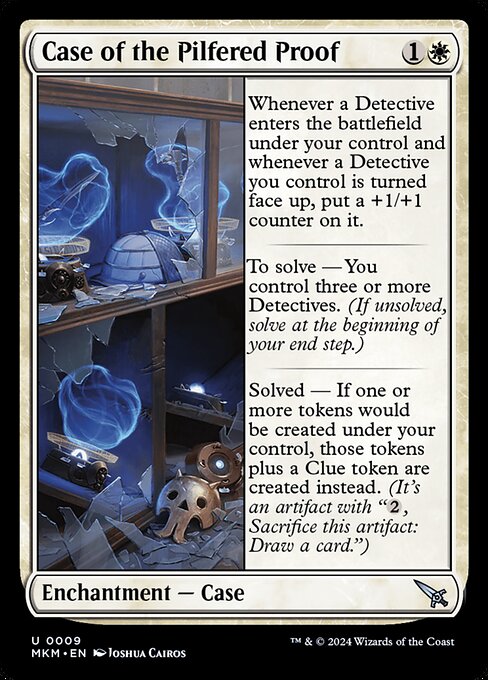

 0
0
 0.07€
0.07€
